
Work Life is Atlassian’s flagship publication dedicated to unleashing the potential of every team through real-life advice, inspiring stories, and thoughtful perspectives from leaders around the world.

Contributing Writer
Work Futurist

Senior Quantitative Researcher, People Insights
Principal Writer


How to build critical thinking skills for better decision-making
It’s simple in theory, but tougher in practice – here are five tips to get you started.
Get stories like this in your inbox
Have you heard the riddle about two coins that equal thirty cents, but one of them is not a nickel? What about the one where a surgeon says they can’t operate on their own son?
Those brain teasers tap into your critical thinking skills. But your ability to think critically isn’t just helpful for solving those random puzzles – it plays a big role in your career.
An impressive 81% of employers say critical thinking carries a lot of weight when they’re evaluating job candidates. It ranks as the top competency companies consider when hiring recent graduates (even ahead of communication ). Plus, once you’re hired, several studies show that critical thinking skills are highly correlated with better job performance.
So what exactly are critical thinking skills? And even more importantly, how do you build and improve them?
What is critical thinking?
Critical thinking is the ability to evaluate facts and information, remain objective, and make a sound decision about how to move forward.
Does that sound like how you approach every decision or problem? Not so fast. Critical thinking seems simple in theory but is much tougher in practice, which helps explain why 65% of employers say their organization has a need for more critical thinking.
In reality, critical thinking doesn’t come naturally to a lot of us. In order to do it well, you need to:
- Remain open-minded and inquisitive, rather than relying on assumptions or jumping to conclusions
- Ask questions and dig deep, rather than accepting information at face value
- Keep your own biases and perceptions in check to stay as objective as possible
- Rely on your emotional intelligence to fill in the blanks and gain a more well-rounded understanding of a situation
So, critical thinking isn’t just being intelligent or analytical. In many ways, it requires you to step outside of yourself, let go of your own preconceived notions, and approach a problem or situation with curiosity and fairness.
It’s a challenge, but it’s well worth it. Critical thinking skills will help you connect ideas, make reasonable decisions, and solve complex problems.
7 critical thinking skills to help you dig deeper
Critical thinking is often labeled as a skill itself (you’ll see it bulleted as a desired trait in a variety of job descriptions). But it’s better to think of critical thinking less as a distinct skill and more as a collection or category of skills.
To think critically, you’ll need to tap into a bunch of your other soft skills. Here are seven of the most important.
Open-mindedness
It’s important to kick off the critical thinking process with the idea that anything is possible. The more you’re able to set aside your own suspicions, beliefs, and agenda, the better prepared you are to approach the situation with the level of inquisitiveness you need.
That means not closing yourself off to any possibilities and allowing yourself the space to pull on every thread – yes, even the ones that seem totally implausible.
As Christopher Dwyer, Ph.D. writes in a piece for Psychology Today , “Even if an idea appears foolish, sometimes its consideration can lead to an intelligent, critically considered conclusion.” He goes on to compare the critical thinking process to brainstorming . Sometimes the “bad” ideas are what lay the foundation for the good ones.
Open-mindedness is challenging because it requires more effort and mental bandwidth than sticking with your own perceptions. Approaching problems or situations with true impartiality often means:
- Practicing self-regulation : Giving yourself a pause between when you feel something and when you actually react or take action.
- Challenging your own biases: Acknowledging your biases and seeking feedback are two powerful ways to get a broader understanding.
Critical thinking example
In a team meeting, your boss mentioned that your company newsletter signups have been decreasing and she wants to figure out why.
At first, you feel offended and defensive – it feels like she’s blaming you for the dip in subscribers. You recognize and rationalize that emotion before thinking about potential causes. You have a hunch about what’s happening, but you will explore all possibilities and contributions from your team members.
Observation
Observation is, of course, your ability to notice and process the details all around you (even the subtle or seemingly inconsequential ones). Critical thinking demands that you’re flexible and willing to go beyond surface-level information, and solid observation skills help you do that.
Your observations help you pick up on clues from a variety of sources and experiences, all of which help you draw a final conclusion. After all, sometimes it’s the most minuscule realization that leads you to the strongest conclusion.
Over the next week or so, you keep a close eye on your company’s website and newsletter analytics to see if numbers are in fact declining or if your boss’s concerns were just a fluke.
Critical thinking hinges on objectivity. And, to be objective, you need to base your judgments on the facts – which you collect through research. You’ll lean on your research skills to gather as much information as possible that’s relevant to your problem or situation.
Keep in mind that this isn’t just about the quantity of information – quality matters too. You want to find data and details from a variety of trusted sources to drill past the surface and build a deeper understanding of what’s happening.
You dig into your email and website analytics to identify trends in bounce rates, time on page, conversions, and more. You also review recent newsletters and email promotions to understand what customers have received, look through current customer feedback, and connect with your customer support team to learn what they’re hearing in their conversations with customers.
The critical thinking process is sort of like a treasure hunt – you’ll find some nuggets that are fundamental for your final conclusion and some that might be interesting but aren’t pertinent to the problem at hand.
That’s why you need analytical skills. They’re what help you separate the wheat from the chaff, prioritize information, identify trends or themes, and draw conclusions based on the most relevant and influential facts.
It’s easy to confuse analytical thinking with critical thinking itself, and it’s true there is a lot of overlap between the two. But analytical thinking is just a piece of critical thinking. It focuses strictly on the facts and data, while critical thinking incorporates other factors like emotions, opinions, and experiences.
As you analyze your research, you notice that one specific webpage has contributed to a significant decline in newsletter signups. While all of the other sources have stayed fairly steady with regard to conversions, that one has sharply decreased.
You decide to move on from your other hypotheses about newsletter quality and dig deeper into the analytics.
One of the traps of critical thinking is that it’s easy to feel like you’re never done. There’s always more information you could collect and more rabbit holes you could fall down.
But at some point, you need to accept that you’ve done your due diligence and make a decision about how to move forward. That’s where inference comes in. It’s your ability to look at the evidence and facts available to you and draw an informed conclusion based on those.
When you’re so focused on staying objective and pursuing all possibilities, inference can feel like the antithesis of critical thinking. But ultimately, it’s your inference skills that allow you to move out of the thinking process and onto the action steps.
You dig deeper into the analytics for the page that hasn’t been converting and notice that the sharp drop-off happened around the same time you switched email providers.
After looking more into the backend, you realize that the signup form on that page isn’t correctly connected to your newsletter platform. It seems like anybody who has signed up on that page hasn’t been fed to your email list.
Communication

3 ways to improve your communication skills at work
If and when you identify a solution or answer, you can’t keep it close to the vest. You’ll need to use your communication skills to share your findings with the relevant stakeholders – like your boss, team members, or anybody who needs to be involved in the next steps.
Your analysis skills will come in handy here too, as they’ll help you determine what information other people need to know so you can avoid bogging them down with unnecessary details.
In your next team meeting, you pull up the analytics and show your team the sharp drop-off as well as the missing connection between that page and your email platform. You ask the web team to reinstall and double-check that connection and you also ask a member of the marketing team to draft an apology email to the subscribers who were missed.
Problem-solving
Critical thinking and problem-solving are two more terms that are frequently confused. After all, when you think critically, you’re often doing so with the objective of solving a problem.
The best way to understand how problem-solving and critical thinking differ is to think of problem-solving as much more narrow. You’re focused on finding a solution.
In contrast, you can use critical thinking for a variety of use cases beyond solving a problem – like answering questions or identifying opportunities for improvement. Even so, within the critical thinking process, you’ll flex your problem-solving skills when it comes time to take action.
Once the fix is implemented, you monitor the analytics to see if subscribers continue to increase. If not (or if they increase at a slower rate than you anticipated), you’ll roll out some other tests like changing the CTA language or the placement of the subscribe form on the page.
5 ways to improve your critical thinking skills

Beyond the buzzwords: Why interpersonal skills matter at work
Think critically about critical thinking and you’ll quickly realize that it’s not as instinctive as you’d like it to be. Fortunately, your critical thinking skills are learned competencies and not inherent gifts – and that means you can improve them. Here’s how:
- Practice active listening: Active listening helps you process and understand what other people share. That’s crucial as you aim to be open-minded and inquisitive.
- Ask open-ended questions: If your critical thinking process involves collecting feedback and opinions from others, ask open-ended questions (meaning, questions that can’t be answered with “yes” or “no”). Doing so will give you more valuable information and also prevent your own biases from influencing people’s input.
- Scrutinize your sources: Figuring out what to trust and prioritize is crucial for critical thinking. Boosting your media literacy and asking more questions will help you be more discerning about what to factor in. It’s hard to strike a balance between skepticism and open-mindedness, but approaching information with questions (rather than unquestioning trust) will help you draw better conclusions.
- Play a game: Remember those riddles we mentioned at the beginning? As trivial as they might seem, games and exercises like those can help you boost your critical thinking skills. There are plenty of critical thinking exercises you can do individually or as a team .
- Give yourself time: Research shows that rushed decisions are often regrettable ones. That’s likely because critical thinking takes time – you can’t do it under the wire. So, for big decisions or hairy problems, give yourself enough time and breathing room to work through the process. It’s hard enough to think critically without a countdown ticking in your brain.
Critical thinking really is critical
The ability to think critically is important, but it doesn’t come naturally to most of us. It’s just easier to stick with biases, assumptions, and surface-level information.
But that route often leads you to rash judgments, shaky conclusions, and disappointing decisions. So here’s a conclusion we can draw without any more noodling: Even if it is more demanding on your mental resources, critical thinking is well worth the effort.
Advice, stories, and expertise about work life today.
- Open training
- Team training
What is Critical Thinking and Why is it Valuable in the Workplace?
- Articles and Resources
- > Personal Effectiveness and Preparing for Change
- > What is Critical Thinking and Why is it Valuable in the Workplace?
There are times at work when you simply have to “do.” A tight deadline, a demanding project outline, or a highly particular superior might mean that it makes sense to complete a task without too much mental tinkering. But work like this can be unsustainable and worse — it won’t leverage your ability to think critically.
There is value in thinking critically in every aspect of your life. From making decisions in your personal life, to interrogating the media you consume, to assessing your work with a critical eye, applying critical thinking is an essential skill everyone should be trying to hone.
At your workplace, critical thinking can distinguish you as a leader, and a valuable mind to bounce ideas off. It can help improve the quality of your work, and the perception those higher up the chain have of you.
Here’s what you need to know about critical thinking in the workplace:
What Exactly is “Critical Thinking”?
In a nutshell, critical thinking is the ability to think reasonably, detaching yourself from personal bias, emotional responses, and subjective opinions. It involves using the data at hand to make a reasoned choice without falling prey to the temptations of doing things simply because they’ve always been done a certain way.
Critical thinking takes time. It might be quicker simply to take instruction at face value, or rely on the traditions of your team. But without analyzing the reasons behind decisions and tasks, it becomes extremely easy to adopt bad habits. This might be time-wasting meetings, inefficient uses of effort, or poor interactions with team members. Taking the time to ask “why” you’re doing something is the first step to thinking critically.
Sometimes, data is available which allows you to make reasoned decisions based on absolute facts. If you can show that a new best practice can objectively improve current processes with hard data, you’ve used the very basics of critical thinking. That said, actual numbers aren’t always available when making a decision. Real critical thinking involves taking a careful look at situations and making a decision based on what is known, not what is felt.
Why Is Critical Thinking Important in the Workplace?
The short answer to the above question is this: critical thinkers make the best decisions, most often. And in the workplace, where choices about how to complete tasks, communicate information, relate with coworkers, and develop strategy are so common, critical thinkers are extremely valuable.
A savvy hiring manager will make this part of the recruitment process. It’s pretty easy to gauge how someone is inclined to solve a problem — ask them how they would deal with a specific situation, and give them the opportunity to use their critical thinking skills, versus deferring to an emotional, or prescribed reaction. Employing people who can think and act reasonably will pay enormous dividends down the road.
Using your critical thinking skills in the workplace will define you as a problem solver. This is not only useful career-wise (although having upper-level people at your company think highly of you is undoubtedly a benefit) it also establishes you as a leader among your fellow team members. Demonstrating your ability to solve problems and accomplish goals effectively will help instill confidence in you with all your coworkers.
How to Use Critical Thinking in the Workplace
The first step to actually using critical thinking is approaching every situation with an open mind. You need to be receptive to all information available, not just the kind that satisfies your preconceived notions or personal biases. This can be easier said than done, of course — lessons learned and beliefs held are often done so with a reason. But when it comes to critical thinking, it’s important to analyze each situation independently.
Once you’ve analyzed a situation with an open mind, you need to consider how to communicate it properly. It’s all very well and good to approach situations with objective logic, but it doesn’t do you any favours to sound like Mr. Spock when you’re conveying your conclusions. Be tactful, patient and humble when you are explaining how and why you’ve come to decisions. Use data if available to support your findings, but understand that not everyone is able to remove emotion from situations.
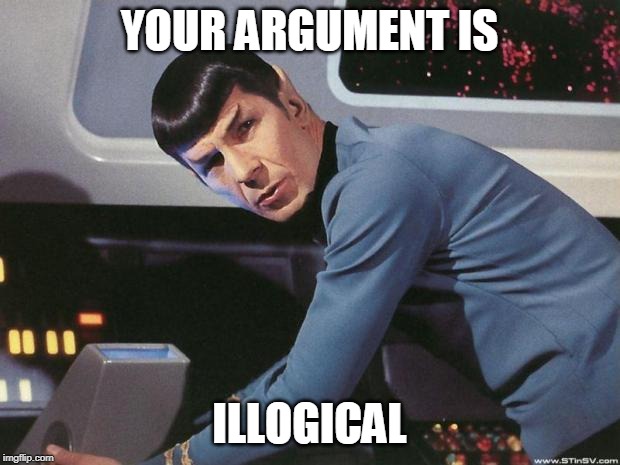
The final, and perhaps least obvious, application with critical thinking is creativity. Often, getting creative means pushing boundaries and reshaping convention. This means taking a risk — one that can often be worth the reward. Using a critical thinking approach when getting creative can help you mitigate the risk, and better determine what value your creativity can bring. It will help you and your team try new things and reinvent current processes while hopefully not rocking the boat too much.
Learn More About Critical Thinking
Critical thinking is a valuable skill for all aspects of your life. It benefits problem solving, creativity, and teamwork. And it translates particularly well to the workplace, where it can distinguish you as a valuable employee and leader.
Taking the extra time to examine things objectively, make decisions based on logic, and communicate it tactfully will help you, those you work with, and your work goals prosper. To learn more about how to do that, have a look at our Critical Thinking and Problem Solving for Effective Decision-Making workshop and register today!
Let us help you create your training solution
Hello we'd love to hear from you.
Complete the form below or reach us at: [email protected] , or 613-234-2020
Contact details
To help you.
- I wish to subscribe to PMC Training content.
Welcome to our new website!
We appreciate your patience as we add the finishing touches. In the meantime, go and explore!
Cookie Usage Disclaimer: This website uses cookies to enhance your browsing experience. By continuing to use this site, you consent to our use of cookies. For more information, please review our Privacy Policy .
See our features in action
How skills-based hiring works
Explore all of our integrations
Assess coding skills
Discover what drives candidates
Test thinking and problem-solving
Evaluate language proficiency
Hire industry-leading tech talent
High-volume hiring done right
Find skilled candidates fast
Our customer success stories
Expert talent assessment articles
Insights into candidate potential
Why it works and how to adopt it

Learn how TestGorilla uses industry-leading science to create skills-based hiring solutions.
The importance of critical thinking in the workplace

Critical thinking is one of the most sought-after skill sets in modern businesses. Actively encouraging critical thinking fosters a culture of adaptability, problem-solving, and continuous improvement that makes your business a great place to work while improving your bottom line.
But, anyone can list critical thinking skills on their resumes. So how do you find candidates who truly possess these abilities?
We can help. Below, we teach you everything you need to know about critical thinking skills, ways to assess critical thinking in the workplace, and common pitfalls to avoid when attempting to hire critical thinkers.
Table of contents
What are critical thinking skills, what you need to know about critical thinking in the workplace , when to hire critical thinkers, why it’s important to foster critical thinking practices in the workplace , how to find the best candidates with critical thinking skills, common mistakes when assessing critical thinking skills, find your next critical thinker with testgorilla.
Critical thinking skills are soft skills that enable employees to analyze, evaluate, and solve problems, and make decisions. These soft skills include:
Logical reasoning
Open-mindedness
Strategizing
Critical thinking isn’t about being critical for the sake of it. It’s about separating fact from fiction, identifying biases, and discovering connections between ideas.
For example, say you're in a team meeting discussing a new project proposal. A colleague presents an idea that seems groundbreaking at first glance. They say it will significantly cut costs, improve efficiency, and revolutionize your approach.
Rather than immediately jumping on the bandwagon, the critical thinkers in the room would take a step back, asking questions like:
Has this been done before? If so, what happened?
What are the drawbacks to this approach?
Will this approach cost anything to implement?
What impact will this have on the overall project cost?
Asking these questions ensures that the chosen path is logical, effective, and well-thought-out.
Here are the top three things you should know about critical thinking in the workplace.
1. It’s one of the most sought-after workplace skills
72% of managers believe critical thinking is key to an organization’s success – but only half believe their employees actually show this skill. This highlights the importance of fostering a workplace culture that actively encourages and nurtures critical thinking skills.
2. Critical thinkers make great managers
Many critical thinking skills – like problem-solving and communication – are textbook signs of a great manager. These skills enable managers to solve challenging problems, think outside the box, and confidently help their teams succeed in uncertain environments.
3. Critical thinking keeps employees on their toes
Critical thinking fosters flexibility and adaptability in a changing business market. This enables workers to navigate uncertainties and evolving situations with agility. They can think on their feet, make decisions on the fly, and ultimately keep your business moving through uncertainty.
Critical thinking skills are universally valuable, making almost any time the right time to hire critical thinkers – regardless of the role or industry.
To determine the best times to hire critical thinkers, consider doing the following:
Regularly evaluate your strategic goals and challenges. Times of change, growth, or adaptation are typically when you need critical thinking the most. For example, during market expansion, product launches, or complex challenges, critical thinkers can provide invaluable insights and innovative solutions.
Read our guide on measuring critical thinking in the workplace . By measuring your current team’s critical thinking skills, you can determine if any important skills are missing from your company. Say your measurements reveal there’s a lack of creative decision-makers on your team. In that case, it might be a good time to look for candidates who demonstrate strong creativity and decision-making skills.
Critical thinking supports overall business success. Here’s why:
1. Encourages continuous learning
Critical thinking encourages employees to actively challenge information, question their colleagues, and seek a deeper understanding of business activities. This encourages a culture of continuous learning.
This culture fosters a dynamic and engaging workplace where intellectual curiosity thrives and your team actively seeks new ways of working. This leads to innovation, adaptability, and sustained success for your organization. In fact, Deloitte’s Leading in Learning report found that businesses that encourage continuous learning have 37% higher productivity and are 92% more likely to innovate than those that don’t.
2. Encourages creative problem-solving
Critical thinking skills encourage employees to look at information in different ways and not accept data at face value. This automatically shifts their perspectives, encouraging out-of-the-box thinking and creative problem-solving.
Businesses that value creative problem-solving can streamline business operations and reduce costs easily.
For example, a creative problem solver at a retail business might implement a novel inventory management system using AI, significantly reducing waste and lowering storage costs. This forward-thinking approach not only optimizes resource use but also enhances the company's ability to respond rapidly to demand fluctuations.
3. Improves conflict resolution
Critical thinking encourages employees to respectfully challenge ideas – and it transforms every conflict into an opportunity for team growth and innovation. It can empower your team to address and resolve conflicts using strong reasoning, consideration of diverse perspectives, and collaboration.
For instance, when a team faces a disagreement on project direction, critical thinking enables them to evaluate all options objectively, leading to a consensus that aligns with the team's overall goals and values.
4. Supports ethical decision-making
Encouraging critical thinking forces decision-makers to defend their ideas, consider alternative perspectives, and address their biases. Inviting other colleagues to critique their ideas will highlight any moral gray areas and identify potential biases that may influence one's judgment. This encourages self-awareness and ensures decisions are objective and ethical.
For example, in a team meeting where a new marketing strategy is proposed, inviting critiques and alternative viewpoints can reveal overlooked ethical considerations or unconscious biases, leading to a more ethical final decision.
You can’t find candidates with critical thinking skills by scanning resumes. Instead, use these methods.
1. Use skills testing
Skills assessments are the best way to find candidates with demonstrable critical thinking skills. These tools reduce time-to-hire, remove bias from your recruitment process, and ensure that you're building a team with the proven ability to think critically in real-world scenarios.
For example, TestGorilla’s Critical Thinking skills test measures deductive reasoning, cause-and-effect thinking, and the ability to interpret sequences.
2. Ask behavioral interview questions
After finding critically thinking candidates using skills assessments, you can use behavioral interview questions to validate candidates’ results and gain a broader understanding of their abilities.
Behavioral interview questions focus on uncovering a candidate's abilities, attitudes, and reactions in past scenarios. Ask a candidate to recall a time they exhibited a certain behavior or provide an example of a time they applied critical thinking skills in a challenging situation.
Critical thinking interview questions might include:
Give me an example of a time you received unclear data as part of a project. What steps did you take to overcome this?
Describe a situation where you had to analyze complex information to develop a solution. How did you approach the problem, and what steps did you take to ensure your solution was effective?
Describe a situation where you had to adapt to an unexpected challenge. What was the challenge, and how did you adapt?
These require candidates to draw on their past experiences and provide concrete examples. They’re an effective way to understand how a candidate has used critical thinking.
3. Ask for evidence of continuous learning
Since critical thinkers actively pursue new understandings, they tend to be lifelong learners. So asking for evidence of continuous learning is a good way to spot critical thinkers.
Try asking questions like:
I can see from your resume that you recently attended a course on managing conflict in the workplace. What did you learn in that course that you didn’t know before?
How do you keep updated with the latest developments in this industry? For example, is there a book or podcast you enjoy listening to?
Can you tell me about a challenging project where you needed to acquire new knowledge or skills? How did you go about this?
Answers to these questions can show that candidates actively participate in continuous learning while also demonstrating evidence of critical thinking.
Here are some pitfalls to avoid when measuring candidates’ critical thinking skills.
Relying on resumes
Candidates can lie on their resumes about their critical thinking abilities. Relying on resumes might lead you to hire someone who lacks the problem-solving abilities the role requires.
Assuming technical skills equal critical thinking
Just because someone is good at their job doesn’t mean they’re a well-rounded critical thinker. For example, a skilled data scientist might be skilled at analyzing complex datasets, but they may be unable to see how this data fits into the bigger picture. Similarly, a great project manager might excel at hitting deadlines and managing budgets, but they may struggle with open-mindedness.
Assuming someone’s technical abilities speak to their critical thinking abilities can lead you to hire someone lacking the critical thinking your company needs.
Critical thinking involves a unique set of soft skills. These enable employees to gain a deeper understanding of workplace situations and challenges to make well-reasoned and logical decisions.
Critical thinking skills are some of the most sought-after skills in modern businesses. However, finding candidates who genuinely possess these skills can be tricky.
Using a combination of TestGorilla’s skills tests and behavioral interview questions, you can assess candidates’ critical thinking skills effectively and accurately.
Want to learn more? Watch a live demo . Or, sign up for a free TestGorilla account today and gain access to our extensive test library .
Related posts

Top 11 pre-employment assessment tools you can use to hire the best talent

11 bookkeeping skills and how to assess them when hiring a bookkeeper

How to write a trading assistant job description
Hire the best candidates with testgorilla..
Create pre-employment assessments in minutes to screen candidates, save time, and hire the best talent.

Latest posts

The best advice in pre-employment testing, in your inbox.
No spam. Unsubscribe at any time.
Hire the best. No bias. No stress.
Our screening tests identify the best candidates and make your hiring decisions faster, easier, and bias-free.
Free resources

Anti-cheating checklist
This checklist covers key features you should look for when choosing a skills testing platform

Onboarding checklist
This resource will help you develop an onboarding checklist for new hires.

How to find candidates with strong attention to detail
How to assess your candidates' attention to detail.

How to get HR certified
Learn how to get human resources certified through HRCI or SHRM.

Improve quality of hire
Learn how you can improve the level of talent at your company.

Case study: How CapitalT reduces hiring bias
Learn how CapitalT reduced hiring bias with online skills assessments.

Resume screening guide
Learn how to make the resume process more efficient and more effective.

Important recruitment metrics
Improve your hiring strategy with these 7 critical recruitment metrics.

Case study: How Sukhi reduces shortlisting time
Learn how Sukhi decreased time spent reviewing resumes by 83%!

12 pre-employment testing hacks
Hire more efficiently with these hacks that 99% of recruiters aren't using.

The benefits of diversity
Make a business case for diversity and inclusion initiatives with this data.
Why Critical Thinking Matters in Your Business

Table of Contents
Many professionals hope to pursue careers they’re passionate about so they can find joy and meaning in their work. Caring deeply about your work is vital for engagement and productivity, but balancing emotions with critical thinking is essential in the workplace.
When employees engage in critical thinking, they use an independent, reflective thought process to evaluate issues and solve problems based on knowledge and objective evidence.
Critical thinking skills can guide your organization toward success, but to truly maximize the problem-solving benefits of critical thinking, it’s crucial to teach this skill to your entire team. We’ll explore critical thinking skills and how to teach them in the workplace to help your business improve its decision-making and problem-solving.
What is critical thinking?
Jen Lawrence, co-author of Engage the Fox: A Business Fable About Thinking Critically and Motivating Your Team , defines critical thinking as “the ability to solve problems effectively by systematically gathering information about an issue, generating further ideas involving a variety of perspectives, evaluating the information using logic, and making sure everyone involved is on board.”
This is a complex definition for a challenging concept. Though critical thinking might seem as straightforward as stepping back and using a formal thinking process instead of reacting instinctively to conflicts or problems, it is actually a much more challenging task.
Critical thinking’s ultimate goal is ensuring you have the best answer to a problem with maximum buy-in from all parties involved – an outcome that will ultimately save your business time, money and stress.
Why is critical thinking essential in the workplace?
A World Economic Forum report revealed that critical thinking is one of the most in-demand career skills employers seek when trying to attract and retain the best employees – and employers believe critical thinking skills will become even more necessary in the coming years.
Critical thinking in the workplace guarantees objective and efficient problem-solving, ultimately reducing costly errors and ensuring that your organization’s resources are used wisely. Team members employing critical thinking can connect ideas, spot errors and inconsistencies, and make the best decisions most often.
Employees with critical thinking are also more likely to accomplish the following:
- Analyzing information
- Thinking outside the box
- Coming up with creative solutions to sudden problems
- Devising thought-through, systematic plans
- Requiring less supervision
Critical thinkers are sure about the reasoning behind their decisions, allowing them to communicate with employees clearly. This level of communication enhances employee engagement .
What are critical thinking skills?
Critical thinking is a soft skill that comprises multiple interpersonal and analytical abilities and attributes. Here are some essential critical thinking skills that can support workforce success.
- Observation: Employees with critical thinking can easily sense and identify an existing problem – and even predict potential issues – based on their experience and sharp perception. They’re willing to embrace multiple points of view and look at the big picture.
- Analytical thinking: Analytical thinkers collect data from multiple sources, reject bias, and ask thoughtful questions. When approaching a problem, they gather and double-check facts, assess independent research, and sift through information to determine what’s accurate and what can help resolve the problem.
- Open-mindedness: Employees who demonstrate critical thinking are open-minded – not afraid to consider opinions and information that differ from their beliefs and assumptions. They listen to colleagues; they can let go of personal biases and recognize that a problem’s solution can come from unexpected sources.
- Problem-solving attitude: Critical thinkers possess a positive attitude toward problem-solving and look for optimal solutions to issues they’ve identified and analyzed. They are usually proactive and willing to offer suggestions based on all the information they receive. [Related article: How to Develop a Positive Attitude in the Workplace ]
- Communication: When managers make a decision, they must share it with the rest of the team and other stakeholders. Critical thinkers demonstrate excellent communication skills and can provide supporting arguments and evidence that substantiate the decision to ensure the entire team is on the same page.
What are the benefits of critical thinking in the workplace?
Many workplaces operate at a frantic tempo that reinforces hasty thinking and rushed business decisions, resulting in costly mistakes and blunders. When employees are trained in critical thinking, they learn to slow the pace and gather crucial information before making decisions.
Along with reducing costly errors, critical thinking in the workplace brings the following benefits:
- Critical thinking improves communication. When employees think more clearly and aren’t swayed by emotion, they communicate better. “If you can think more clearly and better articulate your positions, you can better engage in discussions and make a much more meaningful contribution in your job,” said David Welton, managing partner at Grove Critical Thinking.
- Critical thinking boosts emotional intelligence. It might seem counterintuitive to associate analytical rationality with emotional intelligence . However, team members who possess critical thinking skills are less prone to rash, emotion-driven decisions. Instead, they take time to analyze the situation and make the most informed decision while being mindful and respectful of the emotional and ethical implications.
- Critical thinking encourages creativity. Critical thinkers are open to new ideas and perspectives and accumulate a significant amount of information when facing decisions. Because of this, they’re more likely to come up with creative solutions . They are also curious and don’t shy away from asking open-ended questions.
- Critical thinking saves time and money. By encouraging critical thinking in the workplace, you minimize the need for supervision, catch potential problems early, promote independence and initiative, and free managers to focus on other duties. All this helps your company save valuable time and resources.
Critical thinking skills are essential for dealing with difficult customers because they help your team make informed decisions while managing stressful situations.
How do you teach critical thinking in the workplace?
Experts agree that critical thinking is a teachable skill. Both Lawrence and Welton recommend exploring critical thinking training programs and methods to improve your workplace’s critical thinking proficiency. Here’s a breakdown of how to teach critical thinking in the workplace:
- Identify problem areas. Executives and managers should assess workplace areas most lacking in critical thinking. If mistakes are consistently made, determine whether the issue is a lack of critical thinking or an inherent issue with a team or process. After identifying areas that lack critical thinking, research the type of training best suited to your organization.
- Start small. Employees newly embracing critical thinking might have trouble tackling large issues immediately. Instead, present them with smaller challenges. “Start practicing critical thinking as a skill with smaller problems as examples, and then work your way up to larger problems,” Lawrence said.
- Act preemptively. Teaching and implementing critical thinking training and methodology takes time and patience. Lawrence emphasized that critical thinking skills are best acquired during a time of calm. It might feel urgent to seek critical thinking during a crisis, but critical thinking is a challenging skill to learn amid panic and stress. Critical thinking training is best done preemptively so that when a crisis hits, employees will be prepared and critical thinking will come naturally.
- Allow sufficient time. From a managerial perspective, giving employees extra time on projects or problems might feel stressful in the middle of deadlines and executive pressures. But if you want those working for you to engage in critical thinking processes, it’s imperative to give them ample time. Allowing employees sufficient time to work through their critical thinking process can save the company time and money in the long run.
How do you identify successful critical thinking?
Successful critical thinking happens during a crisis, not after.
Lawrence provided an example involving restaurants and waitstaff: If a customer has a bad experience at a restaurant, a server using critical thinking skills will be more likely to figure out a solution to save the interaction, such as offering a free appetizer or discount. “This can save the hard-earned customer relationship you spent a lot of marketing dollars to create,” Lawrence said. This concept is applicable across many business and organizational structures.
You should also be aware of signs of a lack of critical thinking. Lawrence pointed out that companies that change strategy rapidly, moving from one thing to the next, are likely not engaging in critical thinking. This is also the case at companies that seem to have good ideas but have trouble executing them.
As with many issues in business, company leadership determines how the rest of the organization acts. If leaders have excellent ideas but don’t follow critical thinking processes, their team will not buy into those ideas, and the company will suffer. This is why critical thinking skills often accompany positive communication skills.
“Critical thinking doesn’t just help you arrive at the best answer, but at a solution most people embrace,” Lawrence said. Modeling critical thinking at the top will help the skill trickle down to the rest of the organization, no matter your company’s type or size.
To get your employees thinking critically, conduct employee surveys with well-designed questions to help them identify issues and solutions.
Critical thinking is the key to your business success
When critical thinking is actively implemented in an organization, mistakes are minimized, and operations run more seamlessly.
With training, time and patience, critical thinking can become a second-nature skill for employees at all levels of experience and seniority. The money, time and conflict you’ll save in the long run are worth the extra effort of implementing critical thinking in your workplace.
Rebecka Green contributed to the writing and reporting in this article. Source interviews were conducted for a previous version of this article.

Building Better Businesses
Insights on business strategy and culture, right to your inbox. Part of the business.com network.
- Collaboration |
- How to build your critical thinking ski ...
How to build your critical thinking skills in 7 steps (with examples)

Critical thinking is, well, critical. By building these skills, you improve your ability to analyze information and come to the best decision possible. In this article, we cover the basics of critical thinking, as well as the seven steps you can use to implement the full critical thinking process.
Critical thinking comes from asking the right questions to come to the best conclusion possible. Strong critical thinkers analyze information from a variety of viewpoints in order to identify the best course of action.
Don’t worry if you don’t think you have strong critical thinking abilities. In this article, we’ll help you build a foundation for critical thinking so you can absorb, analyze, and make informed decisions.
What is critical thinking?
Critical thinking is the ability to collect and analyze information to come to a conclusion. Being able to think critically is important in virtually every industry and applicable across a wide range of positions. That’s because critical thinking isn’t subject-specific—rather, it’s your ability to parse through information, data, statistics, and other details in order to identify a satisfactory solution.
Decision-making tools for agile businesses
In this ebook, learn how to equip employees to make better decisions—so your business can pivot, adapt, and tackle challenges more effectively than your competition.
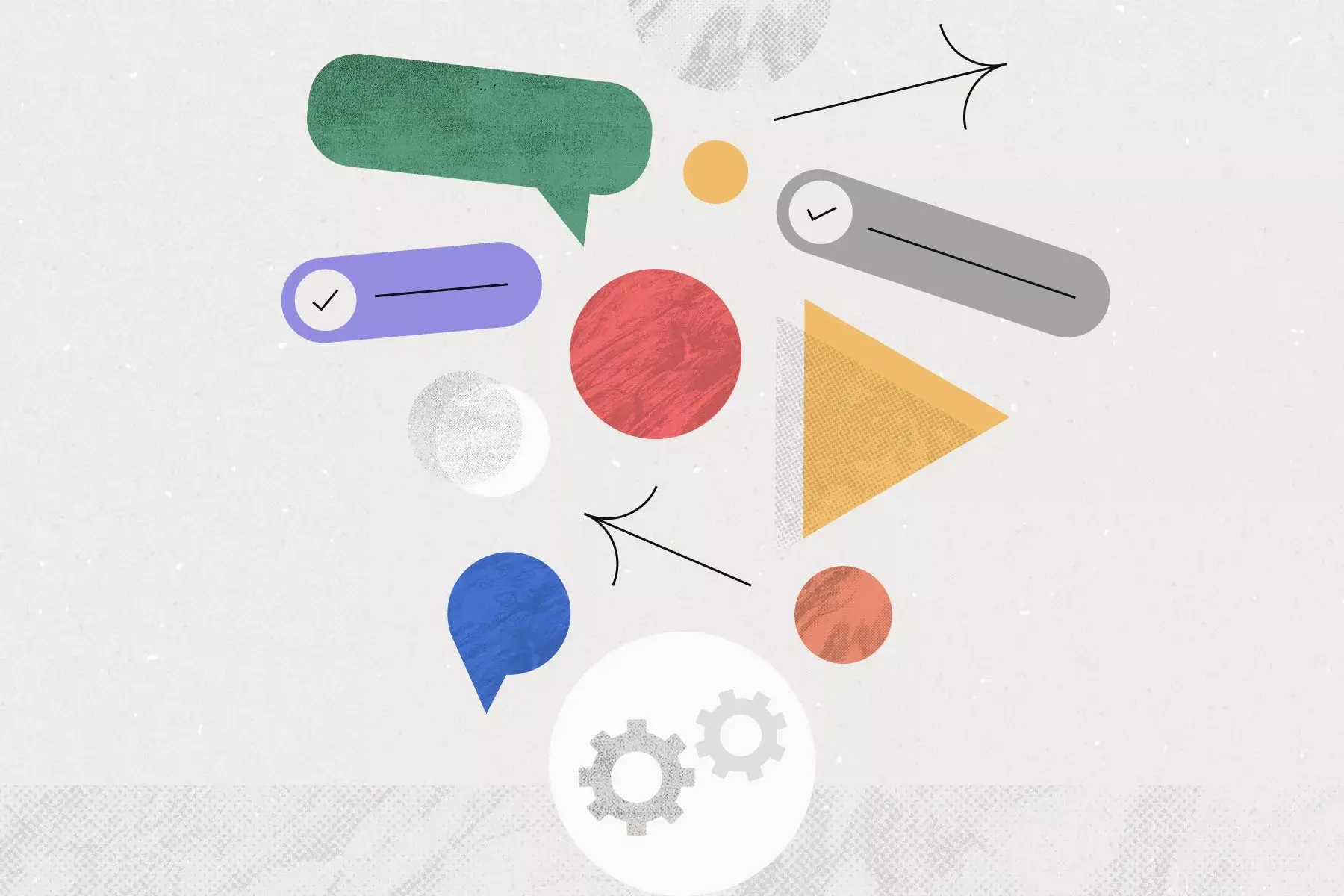
Top 8 critical thinking skills
Like most soft skills, critical thinking isn’t something you can take a class to learn. Rather, this skill consists of a variety of interpersonal and analytical skills. Developing critical thinking is more about learning to embrace open-mindedness and bringing analytical thinking to your problem framing process.
In no particular order, the eight most important critical thinking skills are:
Analytical thinking: Part of critical thinking is evaluating data from multiple sources in order to come to the best conclusions. Analytical thinking allows people to reject bias and strive to gather and consume information to come to the best conclusion.
Open-mindedness: This critical thinking skill helps you analyze and process information to come to an unbiased conclusion. Part of the critical thinking process is letting your personal biases go and coming to a conclusion based on all of the information.
Problem solving : Because critical thinking emphasizes coming to the best conclusion based on all of the available information, it’s a key part of problem solving. When used correctly, critical thinking helps you solve any problem—from a workplace challenge to difficulties in everyday life.
Self-regulation: Self-regulation refers to the ability to regulate your thoughts and set aside any personal biases to come to the best conclusion. In order to be an effective critical thinker, you need to question the information you have and the decisions you favor—only then can you come to the best conclusion.
Observation: Observation skills help critical thinkers look for things beyond face value. To be a critical thinker you need to embrace multiple points of view, and you can use observation skills to identify potential problems.
Interpretation: Not all data is made equal—and critical thinkers know this. In addition to gathering information, it’s important to evaluate which information is important and relevant to your situation. That way, you can draw the best conclusions from the data you’ve collected.
Evaluation: When you attempt to answer a hard question, there is rarely an obvious answer. Even though critical thinking emphasizes putting your biases aside, you need to be able to confidently make a decision based on the data you have available.
Communication: Once a decision has been made, you also need to share this decision with other stakeholders. Effective workplace communication includes presenting evidence and supporting your conclusion—especially if there are a variety of different possible solutions.
7 steps to critical thinking
Critical thinking is a skill that you can build by following these seven steps. The seven steps to critical thinking help you ensure you’re approaching a problem from the right angle, considering every alternative, and coming to an unbiased conclusion.
First things first: When to use the 7 step critical thinking process
There’s a lot that goes into the full critical thinking process, and not every decision needs to be this thought out. Sometimes, it’s enough to put aside bias and approach a process logically. In other, more complex cases, the best way to identify the ideal outcome is to go through the entire critical thinking process.
The seven-step critical thinking process is useful for complex decisions in areas you are less familiar with. Alternatively, the seven critical thinking steps can help you look at a problem you’re familiar with from a different angle, without any bias.
If you need to make a less complex decision, consider another problem solving strategy instead. Decision matrices are a great way to identify the best option between different choices. Check out our article on 7 steps to creating a decision matrix .
1. Identify the problem
Before you put those critical thinking skills to work, you first need to identify the problem you’re solving. This step includes taking a look at the problem from a few different perspectives and asking questions like:
What’s happening?
Why is this happening?
What assumptions am I making?
At first glance, how do I think we can solve this problem?
A big part of developing your critical thinking skills is learning how to come to unbiased conclusions. In order to do that, you first need to acknowledge the biases that you currently have. Does someone on your team think they know the answer? Are you making assumptions that aren’t necessarily true? Identifying these details helps you later on in the process.
2. Research
At this point, you likely have a general idea of the problem—but in order to come up with the best solution, you need to dig deeper.
During the research process, collect information relating to the problem, including data, statistics, historical project information, team input, and more. Make sure you gather information from a variety of sources, especially if those sources go against your personal ideas about what the problem is or how to solve it.
Gathering varied information is essential for your ability to apply the critical thinking process. If you don’t get enough information, your ability to make a final decision will be skewed. Remember that critical thinking is about helping you identify the objective best conclusion. You aren’t going with your gut—you’re doing research to find the best option
3. Determine data relevance
Just as it’s important to gather a variety of information, it is also important to determine how relevant the different information sources are. After all, just because there is data doesn’t mean it’s relevant.
Once you’ve gathered all of the information, sift through the noise and identify what information is relevant and what information isn’t. Synthesizing all of this information and establishing significance helps you weigh different data sources and come to the best conclusion later on in the critical thinking process.
To determine data relevance, ask yourself:
How reliable is this information?
How significant is this information?
Is this information outdated? Is it specialized in a specific field?
4. Ask questions
One of the most useful parts of the critical thinking process is coming to a decision without bias. In order to do so, you need to take a step back from the process and challenge the assumptions you’re making.
We all have bias—and that isn’t necessarily a bad thing. Unconscious biases (also known as cognitive biases) often serve as mental shortcuts to simplify problem solving and aid decision making. But even when biases aren’t inherently bad, you must be aware of your biases in order to put them aside when necessary.
Before coming to a solution, ask yourself:
Am I making any assumptions about this information?
Are there additional variables I haven’t considered?
Have I evaluated the information from every perspective?
Are there any viewpoints I missed?
5. Identify the best solution
Finally, you’re ready to come to a conclusion. To identify the best solution, draw connections between causes and effects. Use the facts you’ve gathered to evaluate the most objective conclusion.
Keep in mind that there may be more than one solution. Often, the problems you’re facing are complex and intricate. The critical thinking process doesn’t necessarily lead to a cut-and-dry solution—instead, the process helps you understand the different variables at play so you can make an informed decision.
6. Present your solution
Communication is a key skill for critical thinkers. It isn’t enough to think for yourself—you also need to share your conclusion with other project stakeholders. If there are multiple solutions, present them all. There may be a case where you implement one solution, then test to see if it works before implementing another solution.
7. Analyze your decision
The seven-step critical thinking process yields a result—and you then need to put that solution into place. After you’ve implemented your decision, evaluate whether or not it was effective. Did it solve the initial problem? What lessons—whether positive or negative—can you learn from this experience to improve your critical thinking for next time?
Depending on how your team shares information, consider documenting lessons learned in a central source of truth. That way, team members that are making similar or related decisions in the future can understand why you made the decision you made and what the outcome was.
Example of critical thinking in the workplace
Imagine you work in user experience design (UX). Your team is focused on pricing and packaging and ensuring customers have a clear understanding of the different services your company offers. Here’s how to apply the critical thinking process in the workplace in seven steps:
Start by identifying the problem
Your current pricing page isn’t performing as well as you want. You’ve heard from customers that your services aren’t clear, and that the page doesn’t answer the questions they have. This page is really important for your company, since it’s where your customers sign up for your service. You and your team have a few theories about why your current page isn’t performing well, but you decide to apply the critical thinking process to ensure you come to the best decision for the page.
Gather information about how the problem started
Part of identifying the problem includes understanding how the problem started. The pricing and packaging page is important—so when your team initially designed the page, they certainly put a lot of thought into it. Before you begin researching how to improve the page, ask yourself:
Why did you design the pricing page the way you did?
Which stakeholders need to be involved in the decision making process?
Where are users getting stuck on the page?
Are any features currently working?
Then, you research
In addition to understanding the history of the pricing and packaging page, it’s important to understand what works well. Part of this research means taking a look at what your competitor’s pricing pages look like.
Ask yourself:
How have our competitors set up their pricing pages?
Are there any pricing page best practices?
How does color, positioning, and animation impact navigation?
Are there any standard page layouts customers expect to see?
Organize and analyze information
You’ve gathered all of the information you need—now you need to organize and analyze it. What trends, if any, are you noticing? Is there any particularly relevant or important information that you have to consider?
Ask open-ended questions to reduce bias
In the case of critical thinking, it’s important to address and set bias aside as much as possible. Ask yourself:
Is there anything I’m missing?
Have I connected with the right stakeholders?
Are there any other viewpoints I should consider?
Determine the best solution for your team
You now have all of the information you need to design the best pricing page. Depending on the complexity of the design, you may want to design a few options to present to a small group of customers or A/B test on the live website.
Present your solution to stakeholders
Critical thinking can help you in every element of your life, but in the workplace, you must also involve key project stakeholders . Stakeholders help you determine next steps, like whether you’ll A/B test the page first. Depending on the complexity of the issue, consider hosting a meeting or sharing a status report to get everyone on the same page.
Analyze the results
No process is complete without evaluating the results. Once the new page has been live for some time, evaluate whether it did better than the previous page. What worked? What didn’t? This also helps you make better critical decisions later on.
Critically successful
Critical thinking takes time to build, but with effort and patience you can apply an unbiased, analytical mind to any situation. Critical thinking makes up one of many soft skills that makes you an effective team member, manager, and worker. If you’re looking to hone your skills further, read our article on the 25 project management skills you need to succeed .
Related resources
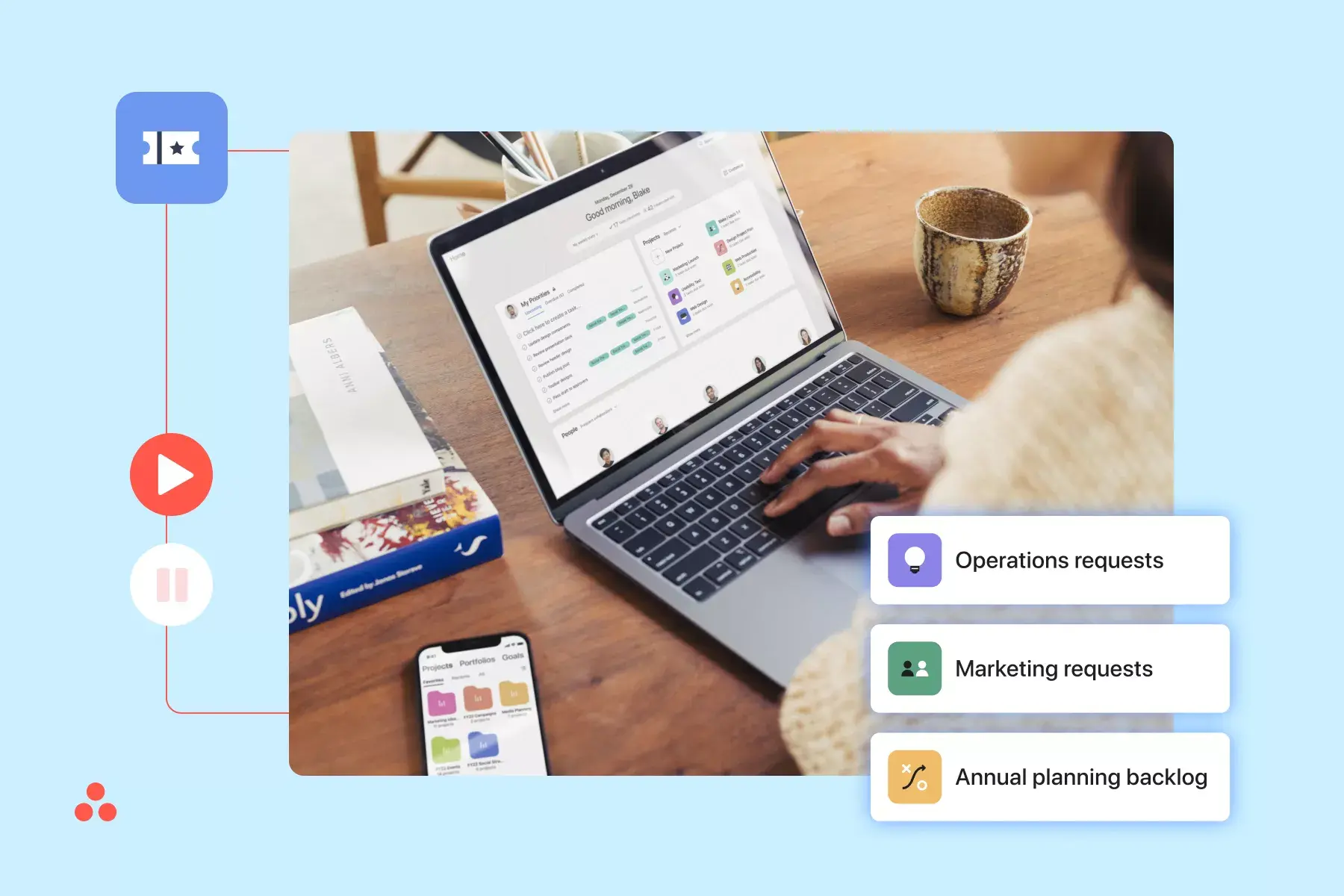
How Asana uses Asana to streamline project intake processes
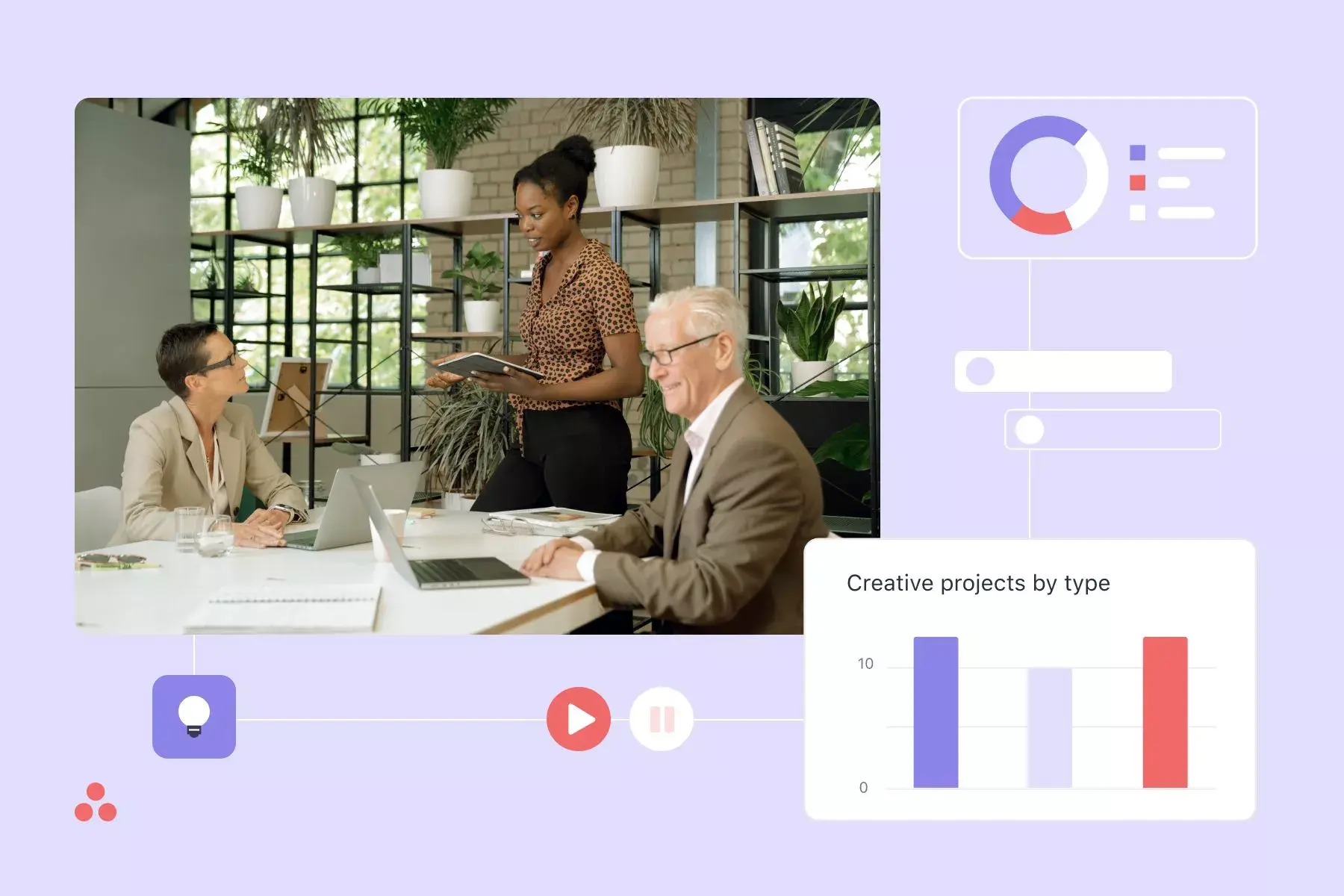
How Asana uses work management for smoother creative production
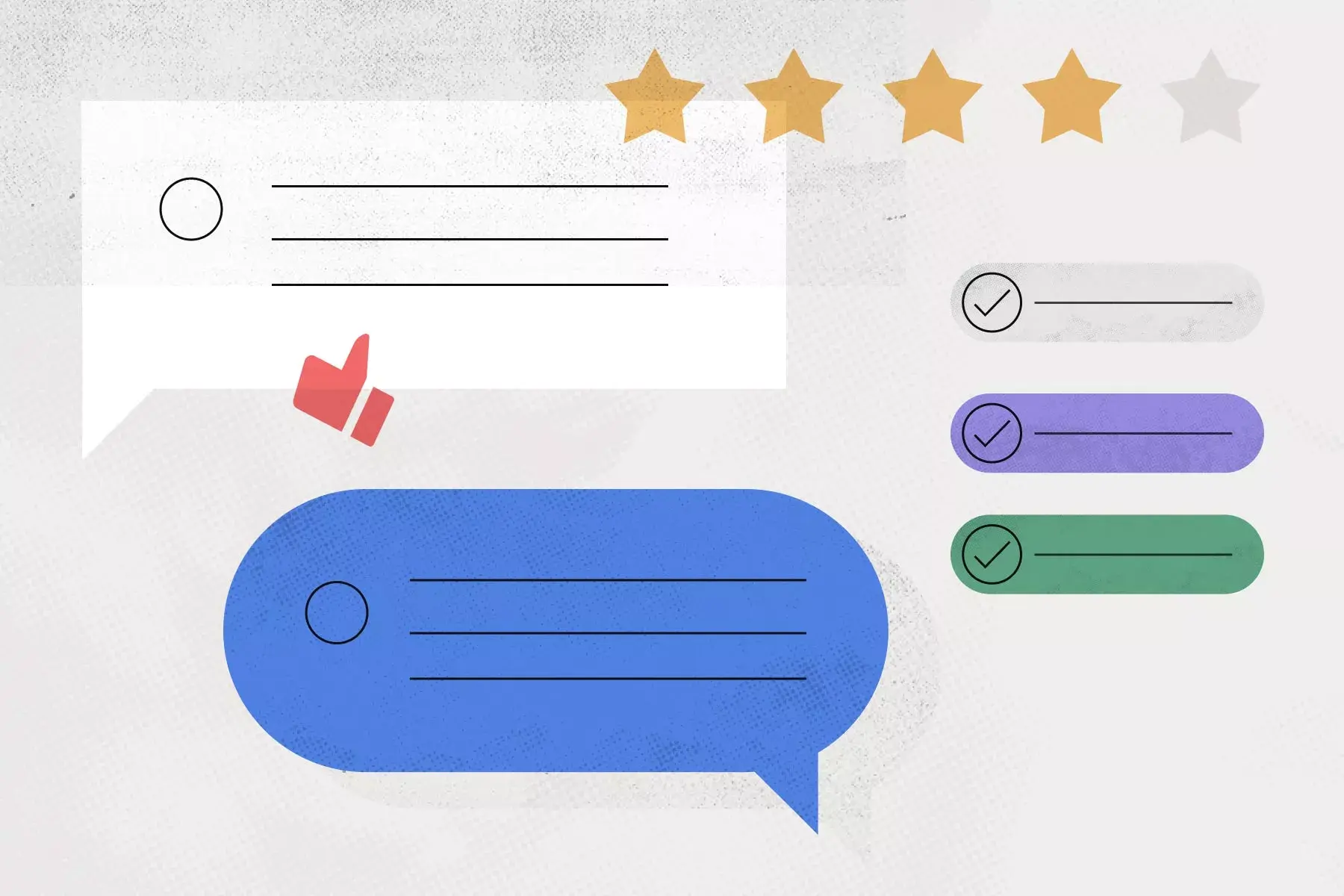
Don’t like giving feedback? These 20 tips are for you
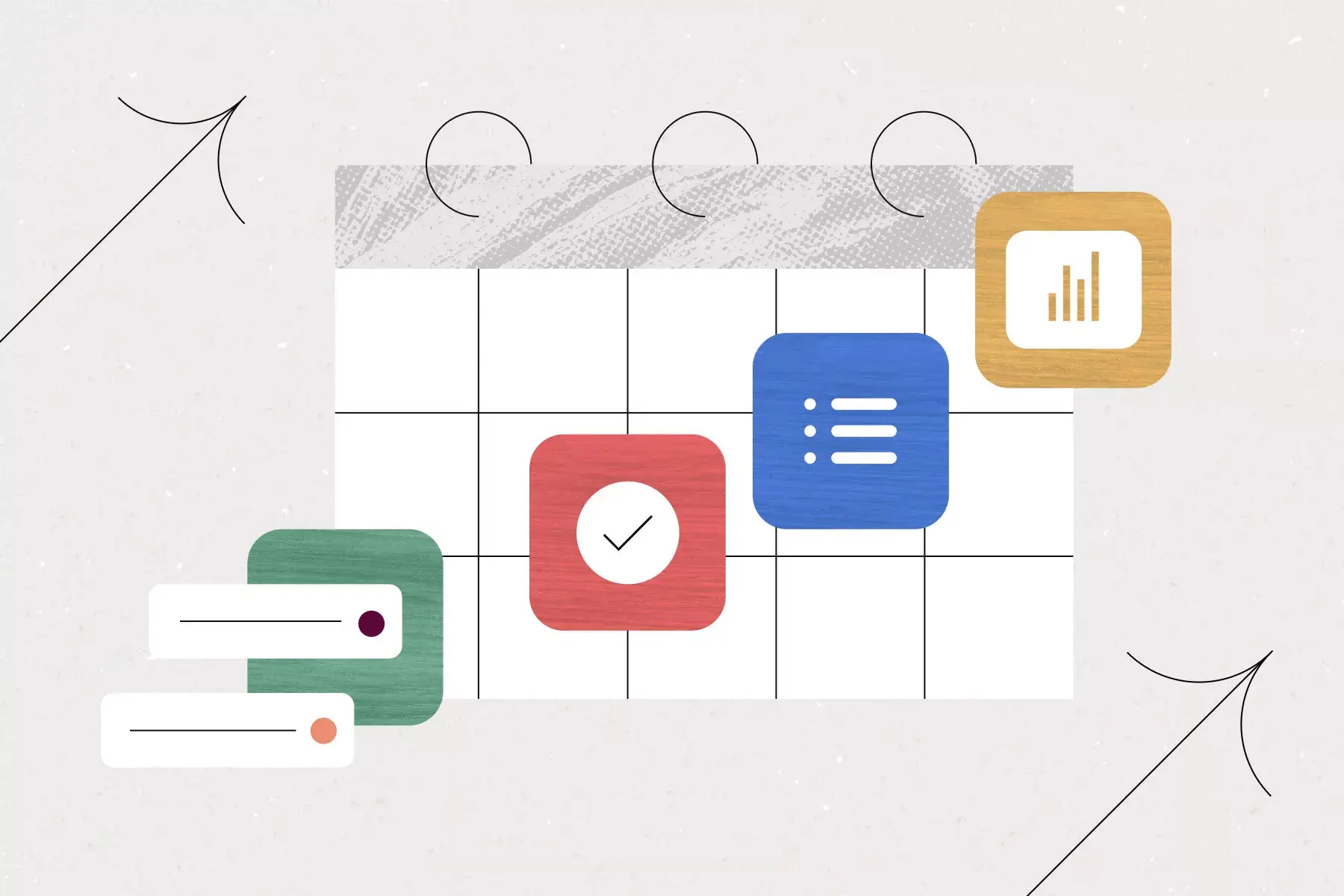
Work schedule types: How to find the right approach for your team

- Appointments

- Resume Reviews

- Undergraduates
- PhDs & Postdocs
- Faculty & Staff
- Prospective Students
- Online Students
- Career Champions
- I’m Exploring
- Architecture & Design
- Education & Academia
- Engineering
- Fashion, Retail & Consumer Products
- Fellowships & Gap Year
- Fine Arts, Performing Arts, & Music
- Government, Law & Public Policy
- Healthcare & Public Health
- International Relations & NGOs
- Life & Physical Sciences
- Marketing, Advertising & Public Relations
- Media, Journalism & Entertainment
- Non-Profits
- Pre-Health, Pre-Law and Pre-Grad
- Real Estate, Accounting, & Insurance
- Social Work & Human Services
- Sports & Hospitality
- Startups, Entrepreneurship & Freelancing
- Sustainability, Energy & Conservation
- Technology, Data & Analytics
- DACA and Undocumented Students
- First Generation and Low Income Students
- International Students
- LGBTQ+ Students
- Transfer Students
- Students of Color
- Students with Disabilities
- Explore Careers & Industries
- Make Connections & Network
- Search for a Job or Internship
- Write a Resume/CV
- Write a Cover Letter
- Engage with Employers
- Research Salaries & Negotiate Offers
- Find Funding
- Develop Professional and Leadership Skills
- Apply to Graduate School
- Apply to Health Professions School
- Apply to Law School
- Self-Assessment
- Experiences
- Post-Graduate
- Jobs & Internships
- Career Fairs
- For Employers
- Meet the Team
- Peer Career Advisors
- Social Media
- Career Services Policies
- Walk-Ins & Pop-Ins
- Strategic Plan 2022-2025
Critical Thinking: A Simple Guide and Why It’s Important
- Share This: Share Critical Thinking: A Simple Guide and Why It’s Important on Facebook Share Critical Thinking: A Simple Guide and Why It’s Important on LinkedIn Share Critical Thinking: A Simple Guide and Why It’s Important on X
Critical Thinking: A Simple Guide and Why It’s Important was originally published on Ivy Exec .
Strong critical thinking skills are crucial for career success, regardless of educational background. It embodies the ability to engage in astute and effective decision-making, lending invaluable dimensions to professional growth.
At its essence, critical thinking is the ability to analyze, evaluate, and synthesize information in a logical and reasoned manner. It’s not merely about accumulating knowledge but harnessing it effectively to make informed decisions and solve complex problems. In the dynamic landscape of modern careers, honing this skill is paramount.
The Impact of Critical Thinking on Your Career
☑ problem-solving mastery.
Visualize critical thinking as the Sherlock Holmes of your career journey. It facilitates swift problem resolution akin to a detective unraveling a mystery. By methodically analyzing situations and deconstructing complexities, critical thinkers emerge as adept problem solvers, rendering them invaluable assets in the workplace.
☑ Refined Decision-Making
Navigating dilemmas in your career path resembles traversing uncertain terrain. Critical thinking acts as a dependable GPS, steering you toward informed decisions. It involves weighing options, evaluating potential outcomes, and confidently choosing the most favorable path forward.
☑ Enhanced Teamwork Dynamics
Within collaborative settings, critical thinkers stand out as proactive contributors. They engage in scrutinizing ideas, proposing enhancements, and fostering meaningful contributions. Consequently, the team evolves into a dynamic hub of ideas, with the critical thinker recognized as the architect behind its success.
☑ Communication Prowess
Effective communication is the cornerstone of professional interactions. Critical thinking enriches communication skills, enabling the clear and logical articulation of ideas. Whether in emails, presentations, or casual conversations, individuals adept in critical thinking exude clarity, earning appreciation for their ability to convey thoughts seamlessly.
☑ Adaptability and Resilience
Perceptive individuals adept in critical thinking display resilience in the face of unforeseen challenges. Instead of succumbing to panic, they assess situations, recalibrate their approaches, and persist in moving forward despite adversity.
☑ Fostering Innovation
Innovation is the lifeblood of progressive organizations, and critical thinking serves as its catalyst. Proficient critical thinkers possess the ability to identify overlooked opportunities, propose inventive solutions, and streamline processes, thereby positioning their organizations at the forefront of innovation.
☑ Confidence Amplification
Critical thinkers exude confidence derived from honing their analytical skills. This self-assurance radiates during job interviews, presentations, and daily interactions, catching the attention of superiors and propelling career advancement.
So, how can one cultivate and harness this invaluable skill?
✅ developing curiosity and inquisitiveness:.
Embrace a curious mindset by questioning the status quo and exploring topics beyond your immediate scope. Cultivate an inquisitive approach to everyday situations. Encourage a habit of asking “why” and “how” to deepen understanding. Curiosity fuels the desire to seek information and alternative perspectives.
✅ Practice Reflection and Self-Awareness:
Engage in reflective thinking by assessing your thoughts, actions, and decisions. Regularly introspect to understand your biases, assumptions, and cognitive processes. Cultivate self-awareness to recognize personal prejudices or cognitive biases that might influence your thinking. This allows for a more objective analysis of situations.
✅ Strengthening Analytical Skills:
Practice breaking down complex problems into manageable components. Analyze each part systematically to understand the whole picture. Develop skills in data analysis, statistics, and logical reasoning. This includes understanding correlation versus causation, interpreting graphs, and evaluating statistical significance.
✅ Engaging in Active Listening and Observation:
Actively listen to diverse viewpoints without immediately forming judgments. Allow others to express their ideas fully before responding. Observe situations attentively, noticing details that others might overlook. This habit enhances your ability to analyze problems more comprehensively.
✅ Encouraging Intellectual Humility and Open-Mindedness:
Foster intellectual humility by acknowledging that you don’t know everything. Be open to learning from others, regardless of their position or expertise. Cultivate open-mindedness by actively seeking out perspectives different from your own. Engage in discussions with people holding diverse opinions to broaden your understanding.
✅ Practicing Problem-Solving and Decision-Making:
Engage in regular problem-solving exercises that challenge you to think creatively and analytically. This can include puzzles, riddles, or real-world scenarios. When making decisions, consciously evaluate available information, consider various alternatives, and anticipate potential outcomes before reaching a conclusion.
✅ Continuous Learning and Exposure to Varied Content:
Read extensively across diverse subjects and formats, exposing yourself to different viewpoints, cultures, and ways of thinking. Engage in courses, workshops, or seminars that stimulate critical thinking skills. Seek out opportunities for learning that challenge your existing beliefs.
✅ Engage in Constructive Disagreement and Debate:
Encourage healthy debates and discussions where differing opinions are respectfully debated.
This practice fosters the ability to defend your viewpoints logically while also being open to changing your perspective based on valid arguments. Embrace disagreement as an opportunity to learn rather than a conflict to win. Engaging in constructive debate sharpens your ability to evaluate and counter-arguments effectively.
✅ Utilize Problem-Based Learning and Real-World Applications:
Engage in problem-based learning activities that simulate real-world challenges. Work on projects or scenarios that require critical thinking skills to develop practical problem-solving approaches. Apply critical thinking in real-life situations whenever possible.
This could involve analyzing news articles, evaluating product reviews, or dissecting marketing strategies to understand their underlying rationale.
In conclusion, critical thinking is the linchpin of a successful career journey. It empowers individuals to navigate complexities, make informed decisions, and innovate in their respective domains. Embracing and honing this skill isn’t just an advantage; it’s a necessity in a world where adaptability and sound judgment reign supreme.
So, as you traverse your career path, remember that the ability to think critically is not just an asset but the differentiator that propels you toward excellence.
- SUGGESTED TOPICS
- The Magazine
- Newsletters
- Managing Yourself
- Managing Teams
- Work-life Balance
- The Big Idea
- Data & Visuals
- Reading Lists
- Case Selections
- HBR Learning
- Topic Feeds
- Account Settings
- Email Preferences
Improve Your Critical Thinking Skills
To make good decisions, it’s important to think critically. And, yet, too many leaders accept the first solution proposed to them or don’t take the time to evaluate a topic from all sides. To guard against these mistakes, there are several things you can do to hone your critical thinking skills. First, question your assumptions, […]
To make good decisions, it’s important to think critically. And, yet, too many leaders accept the first solution proposed to them or don’t take the time to evaluate a topic from all sides. To guard against these mistakes, there are several things you can do to hone your critical thinking skills. First, question your assumptions, especially when the stakes are high. If you’re coming up with a new business strategy, for example, ask: Why is this the best way forward? What does the research say about our expectations for the future of the market? Second, poke at the logic. When evaluating arguments, consider if the evidence builds on itself to produce a sound conclusion. Is the logic supported by data at each point? Third, seek out fresh perspectives. It’s tempting to rely on your inner circle to help you think through these questions, but that won’t be productive if they all look and think like you. Get outside your bubble and ask different people to question and challenge your logic.
Source: Adapted from “3 Simple Habits to Improve Your Critical Thinking,” Helen Lee Bouygues
Partner Center

Tips for Online Students , Tips for Students
Why Is Critical Thinking Important? A Survival Guide

Why is critical thinking important? The decisions that you make affect your quality of life. And if you want to ensure that you live your best, most successful and happy life, you’re going to want to make conscious choices. That can be done with a simple thing known as critical thinking. Here’s how to improve your critical thinking skills and make decisions that you won’t regret.
What Is Critical Thinking?
You’ve surely heard of critical thinking, but you might not be entirely sure what it really means, and that’s because there are many definitions. For the most part, however, we think of critical thinking as the process of analyzing facts in order to form a judgment. Basically, it’s thinking about thinking.
How Has The Definition Evolved Over Time?
The first time critical thinking was documented is believed to be in the teachings of Socrates , recorded by Plato. But throughout history, the definition has changed.
Today it is best understood by philosophers and psychologists and it’s believed to be a highly complex concept. Some insightful modern-day critical thinking definitions include :
- “Reasonable, reflective thinking that is focused on deciding what to believe or do.”
- “Deciding what’s true and what you should do.”
The Importance Of Critical Thinking
Why is critical thinking important? Good question! Here are a few undeniable reasons why it’s crucial to have these skills.
1. Critical Thinking Is Universal
Critical thinking is a domain-general thinking skill. What does this mean? It means that no matter what path or profession you pursue, these skills will always be relevant and will always be beneficial to your success. They are not specific to any field.
2. Crucial For The Economy
Our future depends on technology, information, and innovation. Critical thinking is needed for our fast-growing economies, to solve problems as quickly and as effectively as possible.
3. Improves Language & Presentation Skills
In order to best express ourselves, we need to know how to think clearly and systematically — meaning practice critical thinking! Critical thinking also means knowing how to break down texts, and in turn, improve our ability to comprehend.
4. Promotes Creativity
By practicing critical thinking, we are allowing ourselves not only to solve problems but also to come up with new and creative ideas to do so. Critical thinking allows us to analyze these ideas and adjust them accordingly.

5. Important For Self-Reflection
Without critical thinking, how can we really live a meaningful life? We need this skill to self-reflect and justify our ways of life and opinions. Critical thinking provides us with the tools to evaluate ourselves in the way that we need to.

6. The Basis Of Science & Democracy
In order to have a democracy and to prove scientific facts, we need critical thinking in the world. Theories must be backed up with knowledge. In order for a society to effectively function, its citizens need to establish opinions about what’s right and wrong (by using critical thinking!).
Benefits Of Critical Thinking
We know that critical thinking is good for society as a whole, but what are some benefits of critical thinking on an individual level? Why is critical thinking important for us?
1. Key For Career Success
Critical thinking is crucial for many career paths. Not just for scientists, but lawyers , doctors, reporters, engineers , accountants, and analysts (among many others) all have to use critical thinking in their positions. In fact, according to the World Economic Forum, critical thinking is one of the most desirable skills to have in the workforce, as it helps analyze information, think outside the box, solve problems with innovative solutions, and plan systematically.
2. Better Decision Making
There’s no doubt about it — critical thinkers make the best choices. Critical thinking helps us deal with everyday problems as they come our way, and very often this thought process is even done subconsciously. It helps us think independently and trust our gut feeling.
3. Can Make You Happier!
While this often goes unnoticed, being in touch with yourself and having a deep understanding of why you think the way you think can really make you happier. Critical thinking can help you better understand yourself, and in turn, help you avoid any kind of negative or limiting beliefs, and focus more on your strengths. Being able to share your thoughts can increase your quality of life.
4. Form Well-Informed Opinions
There is no shortage of information coming at us from all angles. And that’s exactly why we need to use our critical thinking skills and decide for ourselves what to believe. Critical thinking allows us to ensure that our opinions are based on the facts, and help us sort through all that extra noise.
5. Better Citizens
One of the most inspiring critical thinking quotes is by former US president Thomas Jefferson: “An educated citizenry is a vital requisite for our survival as a free people.” What Jefferson is stressing to us here is that critical thinkers make better citizens, as they are able to see the entire picture without getting sucked into biases and propaganda.
6. Improves Relationships
While you may be convinced that being a critical thinker is bound to cause you problems in relationships, this really couldn’t be less true! Being a critical thinker can allow you to better understand the perspective of others, and can help you become more open-minded towards different views.
7. Promotes Curiosity
Critical thinkers are constantly curious about all kinds of things in life, and tend to have a wide range of interests. Critical thinking means constantly asking questions and wanting to know more, about why, what, who, where, when, and everything else that can help them make sense of a situation or concept, never taking anything at face value.
8. Allows For Creativity
Critical thinkers are also highly creative thinkers, and see themselves as limitless when it comes to possibilities. They are constantly looking to take things further, which is crucial in the workforce.
9. Enhances Problem Solving Skills
Those with critical thinking skills tend to solve problems as part of their natural instinct. Critical thinkers are patient and committed to solving the problem, similar to Albert Einstein, one of the best critical thinking examples, who said “It’s not that I’m so smart; it’s just that I stay with problems longer.” Critical thinkers’ enhanced problem-solving skills makes them better at their jobs and better at solving the world’s biggest problems. Like Einstein, they have the potential to literally change the world.
10. An Activity For The Mind
Just like our muscles, in order for them to be strong, our mind also needs to be exercised and challenged. It’s safe to say that critical thinking is almost like an activity for the mind — and it needs to be practiced. Critical thinking encourages the development of many crucial skills such as logical thinking, decision making, and open-mindness.
11. Creates Independence
When we think critically, we think on our own as we trust ourselves more. Critical thinking is key to creating independence, and encouraging students to make their own decisions and form their own opinions.
12. Crucial Life Skill
Critical thinking is crucial not just for learning, but for life overall! Education isn’t just a way to prepare ourselves for life, but it’s pretty much life itself. Learning is a lifelong process that we go through each and every day.
How to Think Critically
Now that you know the benefits of thinking critically, how do you actually do it?
How To Improve Your Critical Thinking
- Define Your Question: When it comes to critical thinking, it’s important to always keep your goal in mind. Know what you’re trying to achieve, and then figure out how to best get there.
- Gather Reliable Information: Make sure that you’re using sources you can trust — biases aside. That’s how a real critical thinker operates!
- Ask The Right Questions: We all know the importance of questions, but be sure that you’re asking the right questions that are going to get you to your answer.
- Look Short & Long Term: When coming up with solutions, think about both the short- and long-term consequences. Both of them are significant in the equation.
- Explore All Sides: There is never just one simple answer, and nothing is black or white. Explore all options and think outside of the box before you come to any conclusions.
How Is Critical Thinking Developed At School?
Critical thinking is developed in nearly everything we do. However, much of this important skill is encouraged to be practiced at school, and rightfully so! Critical thinking goes beyond just thinking clearly — it’s also about thinking for yourself.
When a teacher asks a question in class, students are given the chance to answer for themselves and think critically about what they learned and what they believe to be accurate. When students work in groups and are forced to engage in discussion, this is also a great chance to expand their thinking and use their critical thinking skills.
How Does Critical Thinking Apply To Your Career?
Once you’ve finished school and entered the workforce, your critical thinking journey only expands and grows from here!
Impress Your Employer
Employers value employees who are critical thinkers, ask questions, offer creative ideas, and are always ready to offer innovation against the competition. No matter what your position or role in a company may be, critical thinking will always give you the power to stand out and make a difference.
Careers That Require Critical Thinking
Some of many examples of careers that require critical thinking include:
- Human resources specialist
- Marketing associate
- Business analyst
Truth be told however, it’s probably harder to come up with a professional field that doesn’t require any critical thinking!
Photo by Oladimeji Ajegbile from Pexels
What is someone with critical thinking skills capable of doing.
Someone with critical thinking skills is able to think rationally and clearly about what they should or not believe. They are capable of engaging in their own thoughts, and doing some reflection in order to come to a well-informed conclusion.
A critical thinker understands the connections between ideas, and is able to construct arguments based on facts, as well as find mistakes in reasoning.
The Process Of Critical Thinking
The process of critical thinking is highly systematic.
What Are Your Goals?
Critical thinking starts by defining your goals, and knowing what you are ultimately trying to achieve.
Once you know what you are trying to conclude, you can foresee your solution to the problem and play it out in your head from all perspectives.
What Does The Future Of Critical Thinking Hold?
The future of critical thinking is the equivalent of the future of jobs. In 2020, critical thinking was ranked as the 2nd top skill (following complex problem solving) by the World Economic Forum .
We are dealing with constant unprecedented changes, and what success is today, might not be considered success tomorrow — making critical thinking a key skill for the future workforce.
Why Is Critical Thinking So Important?
Why is critical thinking important? Critical thinking is more than just important! It’s one of the most crucial cognitive skills one can develop.
By practicing well-thought-out thinking, both your thoughts and decisions can make a positive change in your life, on both a professional and personal level. You can hugely improve your life by working on your critical thinking skills as often as you can.
Related Articles
What Are the Benefits of Critical Thinking in the Workplace?
- Small Business
- Business & Workplace Regulations
- Workplace Safety
- ')" data-event="social share" data-info="Pinterest" aria-label="Share on Pinterest">
- ')" data-event="social share" data-info="Reddit" aria-label="Share on Reddit">
- ')" data-event="social share" data-info="Flipboard" aria-label="Share on Flipboard">
How Is a LLC Run?
Participatory management styles, analysis of organizational management & leadership practices.
- How to Open Disk Utility on a Mac
- Analytical Tools for Developing a Strategic Plan
Critical thinking is the act of analyzing a subject or a situation and forming a judgment based on that analysis. Nearly everybody uses some form of critical thinking in day-to-day life, which often includes critical thinking at work. Most jobs, even seemingly nominal jobs, involve at least some critical thinking. However, the type of critical thinking an individual does at work can vary greatly according to the industry and their role in the company.
According to Business News Daily , critical thinking is the process of solving problems through rational means and evidence-based knowledge. There are a lot of benefits to critical thinking at work. Overall, a team that employs critical thinking when challenges arise is a team that solves problems, finds solutions, and works together cohesively.
Benefits of Critical Thinking
An employee's ability to think critically doesn't benefit only the employer; it benefits the employee as well. Critical thinking is a lifetime skill that an individual can use in every area of life, including interpersonal relationships, financial planning, personal goal-setting and career decisions.
For employers, the benefits of employees' critical thinking include:
- Finding multiple solutions to problems
- Effective communication between teams and individual employees
- Developing unique perspectives on situations and challenges at work
Critical Thinking in Business Management
It's important for every member of an organization to think critically, but perhaps the most critical area for this skill lies in business management. A manager is tasked not only with ensuring each member of the team performs their tasks correctly but also with making the big decisions that can have far-reaching repercussions, both positive and negative.
Specific applications of critical thinking in business management include:
- Anticipating problems and preventing them before they arise
- Finding ways to cut expenses
- Planning and implementing business strategies
- Delegating tasks to qualified team members
- Effectively interviewing job applicants and selecting those who are the best fit for the company
Benefits of critical thinking in business management include:
- Building a well-qualified team with low turnover
- Having a solution plan for each potential challenge
- Streamlined, efficient work processes
- Effective communication between the manager and team members
Critical Thinking in Business Examples
Critical thinking is a soft skill. According to Rider University , soft skills are the workplace skills that cannot be quantified but are nonetheless a key component of workplace success. Indeed categorizes soft skills as including creativity, empathy and open-mindedness. In contrast, hard skills include specific skills, such as knowing programming languages, knowing how to manage a database, and speaking multiple languages.
Critical thinking in business in general is similar to critical thinking in business management. The primary difference is that it deals more with operating a business than with managing teams. A few examples include:
- Predicting how much demand there will be for a product or service based on industry data and trends
- Gauging how well a new business will likely perform based on the demographics of its proposed location
- Planning efficient ways to use company budgets
Exercises for Critical Thinking
Critical thinking is a skill that can be taught and strengthened. Like most other skills, it should be exercised regularly to ensure employees do not become complacent and they have the tools to handle modern challenges that arise at work.
Exercises for critical thinking used by companies across the U.S. and the world include:
- Working through a challenge backward
- Explaining a process as if speaking to a six-year-old
- Expressing ideas through multiple mediums
Each of these exercises for critical thinking forces the participants to approach a challenge in a way they might not have approached it before. By doing this, they are forced to look at the challenge differently and find a creative way to solve it.
- Business News Daily: Why Critical Thinking Matters in Your Business
- Indeed: Soft Skills: Definitions and Examples
- Rider University: Why Is Critical Thinking Important in Business?
- American Scientific Affiliation: Critical Thinking Skills in Education and Life
Lindsay Kramer has been a small business owner since 2014. She's no stranger to the wild ride that running a business can be, but that doesn't mean she's done learning...every day, it's something different when you're in the driver's seat. Now, she's focusing her writing on helping other small business owners and people planning to become small business owners navigate this crazy thing we call entrepreneurship.
Related Articles
Positive consequences of emotions in the workplace, how to connect a mac to a server using sftp, 5 abilities a person needs to run a business, what is 'systems thinking' in business, what is the difference between team building & teamwork, about conflict management, behaviorist concepts for employees, what is a staffing assistant, the difference between managerial functions & managerial skills, most popular.
- 1 Positive Consequences of Emotions in the Workplace
- 2 How to Connect a Mac to a Server Using SFTP
- 3 5 Abilities a Person Needs to Run a Business
- 4 What Is 'Systems Thinking' in Business?
How to Develop Critical Thinking Skills in the Workplace? – Explained
In the modern workplace, the ability to think critically is more than just a valuable asset—it’s a necessity for success.
According to a recent survey by the World Economic Forum, 36% of employers consider complex problem-solving skills, a key component of critical thinking, as the top skill they seek in their workforce.
This blog post explains this top skill – critical thinking skills in the workplace and its core components and what is importance of having this skill in the modern workplace.
With useful practical tips, this blog post also explains how professionals can develop and boost their critical thinking skills.
Let’s start reading and check this out this interesting concept.
Definition of critical thinking
Critical thinking is a cognitive process characterized by the ability to analyze, evaluate, and synthesize information in a purposeful and reflective manner.
It involves the careful consideration of evidence, arguments, and various perspectives to make reasoned and well-informed decisions.
Critical thinking goes beyond simply accepting information at face value; instead, it encourages individuals to question assumptions, challenge assumptions, and engage in independent and objective inquiry.
This skill set encompasses a range of abilities, including problem-solving, logical reasoning, effective communication, and the capacity to make sound judgments.
Five Core components of critical thinking
The five components form the backbone of critical thinking and these components make it a structured and comprehensive approach.
Understanding the five core components of critical thinking help us to understand this cognitive skill and its broader implications in decision-making and problem-solving.
Here are 5 core components of critical thinking.
1. Analysis:
Analysis is a fundamental component of critical thinking.
It involves breaking down complex issues into manageable parts to identify patterns, trends, or crucial elements.
Through analysis, individuals can discern the significance of information, recognize potential biases, and uncover hidden assumptions.
This analytical skill empowers professionals to make well-informed decisions by understanding the intricacies of a situation and grasping the implications of various factors.
2. Interpretation:
Interpretation is about making sense of information, finding meaning in data, and turning it into clear insights.
Critical thinkers look at the context of information, consider different points of view, and understand the intended message.
This skill is essential for dealing with uncertainty and grasping the significance of information in a particular situation.
Interpretation helps people look beyond the basic data and uncover deeper insights, which is useful for making decisions and communicating effectively.
3. Inference:
Inference means drawing logical conclusions from the information and evidence at hand.
Critical thinkers use inference to go beyond what is directly stated, making well-thought-out assumptions and predictions.
This aspect involves thinking about the consequences of information and finding logical connections between different pieces of data.
In the workplace, the ability to make sound inferences is essential for anticipating outcomes, predicting trends, and formulating strategies based on a comprehensive understanding of the available information.
4. Explanation:
Explaining is the ability to express one’s thought process, reasoning, or the logic behind a specific decision or conclusion in a clear and concise manner.
Critical thinkers not only reach well-founded judgments but also possess the skill to effectively communicate these insights to others.
Through clear explanations, individuals can convey complex ideas, facilitate discussions, and contribute to a culture of open communication in the workplace.
5. Problem-solving:
Critical thinking culminates in problem-solving, where individuals apply their analytical, interpretative, inferential, and explanatory skills to address challenges and make decisions.
Problem-solving is an active and iterative process that involves defining problems, generating and evaluating potential solutions, and implementing the most effective course of action.
Critical thinkers approach problem-solving with creativity, adaptability, and a willingness to explore unconventional solutions.
This component is particularly crucial in dynamic work environments were navigating complexities and finding innovative solutions are essential for success.
Importance of critical thinking in the workplace
Critical thinking is of paramount importance in the workplace for several reasons, as it serves as a foundational skill that enhances individual and organizational effectiveness.
Here are key reasons highlighting the significance of critical thinking in the workplace:
Informed Decision-Making:
Critical thinking enables individuals to analyze information, weigh evidence, and make informed decisions.
In a professional setting, decision-making often involves complex factors, and individuals with strong critical thinking skills are better equipped to navigate uncertainties and choose the most effective course of action.
Problem-Solving:
In any workplace, challenges and problems are abundant that demand creative and efficient solutions.
Critical thinking allows employees to approach problems systematically, identify root causes, and develop innovative solutions.
This skill is particularly valuable in dynamic industries where adaptability and creative problem-solving are essential.
Effective Communication:
Effective communication is essential in any workplace.
Critical thinkers have the ability to express their thoughts, ideas, and reasoning in a clear and compelling manner.
They can also engage in constructive discussions, consider different viewpoints, and communicate effectively with diverse stakeholders.
Innovation and Adaptability:
In today’s rapidly evolving business landscape, organizations need to innovate and adapt to stay competitive.
Critical thinkers are more likely to embrace change, explore new ideas, and contribute to an environment that fosters innovation.
They are open to exploring alternative solutions and challenging the status quo.
Efficient Planning and Execution:
Critical thinking is instrumental in strategic planning and the effective execution of tasks.
Individuals who can analyze situations, establish priorities, and devise well-thought-out plans are more likely to achieve their goals, contributing to the overall success of the organization.
Quality Analysis and Evaluation:
Critical thinkers possess the ability to assess the quality and relevance of information. This is particularly crucial in a world inundated with data.
Employees who can discern between reliable and unreliable information contribute to better decision-making and organizational effectiveness.
Team Collaboration:
Teams benefit from individuals who can critically evaluate ideas, contribute thoughtful insights, and work collaboratively towards common goals.
Teams thrive when individuals can critically evaluate ideas, contribute thoughtful insights, and collaborate toward common goals.
Critical thinkers foster a positive team dynamic by promoting open communication, constructive feedback, and shared problem-solving.
Ethical Decision-Making:
Critical thinking plays a crucial role in ethical decision-making.
It enables individuals to carefully consider the ethical implications of their choices, ensuring that decisions align with organizational values and ethical standards.
Examples of Critical thinking in workplace
These examples illustrate how critical thinking is not a theoretical concept but a practical and invaluable skill in the workplace, applicable across various scenarios and roles.
Decision-Making in a Crisis:
Imagine a senior executive facing a sudden crisis that could impact the entire organization.
Critical thinking comes into play as they analyze the situation, interpret available information, make inferences about potential outcomes, and explain their decision-making process.
In this scenario, critical thinking enables the executive to navigate the crisis with a level-headed approach, considering various factors before deciding on a course of action.
Project Management and Problem-Solving:
Consider a scenario where a project manager faces unforeseen challenges in the implementation of a crucial project.
Critical thinking skills allow the manager to analyze the root causes of the issues, interpret the implications for project timelines and goals, make inferences about potential solutions, and explain the chosen strategy to the team.
The ability to problem-solve through critical thinking ensures the project stays on track and meets its objectives.
Effective Communication and Conflict Resolution:
In a team setting, conflicts may arise due to differing perspectives or misunderstandings.
Critical thinking helps team members analyze the underlying issues, interpret each other’s viewpoints, make inferences about the root causes of the conflict, and explain their concerns.
By applying critical thinking to communication, individuals can engage in constructive dialogue, find common ground, and contribute to conflict resolution within the team.
Strategic Planning and Innovation:
An organization aims to enter a new market and needs to develop a strategic plan.
Imagine an organization looking to enter a new market and needing to develop a strategic plan.
Critical thinking becomes crucial in analyzing market trends, interpreting consumer behavior, making educated guesses about potential challenges and opportunities, and explaining the reasoning behind the chosen market entry strategy.
Integrating critical thinking into strategic planning not only fosters innovation but also equips organizations to adapt to the ever-changing dynamics of the market.
Quality Improvement in Processes:
In a manufacturing setting, consider a scenario where a quality control manager identifies a recurring issue with a product.
Critical thinking becomes essential as the manager analyzes production processes, interprets data on defects, makes educated guesses about potential causes, and explains the proposed changes to improve quality.
Applying critical thinking to process improvement ensures that decisions are well-founded and contribute to long-term efficiency and product quality.
Employee Training and Development:
HR professionals tasked with enhancing employee skills use critical thinking to analyze the training needs of the workforce, interpret the relevance of different training programs, make inferences about the potential impact on employee performance, and explain the chosen development initiatives.
Critical thinking in this context ensures that training efforts align with organizational goals and contribute to the professional growth of employees.
How to Develop Critical Thinking Skills in the Workplace?
This holistic strategy ensures that critical thinking becomes not just a skill to acquire but a fundamental aspect of the organizational culture, contributing to enhanced decision-making and problem-solving capabilities across the workforce.
Here are some steps that can be taken to develop critical thinking skills in the workplace.
1. Continuous Learning and Education:
Promoting continuous learning and education is essential for nurturing critical thinking skills in the workplace. This includes offering employees access to workshops, training programs, and online courses tailored to foster critical thinking development.
Workshops could focus on problem-solving methodologies, logical reasoning, and decision-making processes.
These initiatives empower employees to enhance their analytical abilities, interpret information effectively, and continually refine their critical thinking skills.
By investing in ongoing education, organizations demonstrate a commitment to fostering a culture of intellectual growth and adaptability.
2. Fostering a Culture of Curiosity:
Creating a workplace culture that values curiosity is essential for nurturing critical thinking skills.
This involves promoting an environment where asking questions is encouraged, and diverse perspectives are welcomed.
Leaders play a pivotal role in fostering curiosity by modeling inquisitive behavior, acknowledging and rewarding employees for their curiosity-driven contributions, and creating platforms for open discussions.
Cultivating curiosity not only stimulates critical thinking but also instills a proactive mindset that seeks to understand complexities and explore innovative solutions.
3. Practicing Reflection and Self-Awareness:
Critical thinking is strengthened through reflective practices and self-awareness.
Employees can engage in journaling, self-assessment exercises, and regular reflection sessions to evaluate their thinking processes, decision-making patterns, and problem-solving approaches.
Encouraging individuals to critically assess their own thoughts and actions fosters a continuous improvement mindset.
Additionally, feedback from supervisors and peers can provide valuable insights, contributing to the ongoing development of an individual’s critical thinking skills.
Employees can participate in activities such as journaling, self-assessment exercises, and regular reflection sessions to assess their thinking processes, decision-making patterns, and problem-solving approaches. Encouraging individuals to critically evaluate their thoughts and actions fosters a mindset of continuous improvement.
Furthermore, receiving feedback from supervisors and peers offers valuable insights, contributing to the continual development of an individual’s critical thinking skills.
4. Problem-Solving Exercises and Case Studies:
Practical application is crucial for honing critical thinking skills.
Organizations can incorporate problem-solving exercises and case studies into training programs or team-building activities.
These exercises present real-world scenarios that require individuals or teams to analyze information, interpret data, make inferences, and develop solutions.
Engaging in hands-on problem-solving not only reinforces theoretical knowledge but also allows employees to apply critical thinking in a contextualized and meaningful way.
5. Integrating Critical Thinking into Daily Work:
To truly embed critical thinking into the workplace culture, organizations should integrate it into daily work practices.
For a genuine integration of critical thinking into the workplace culture, organizations should weave it into daily work practices.
This involves incorporating critical thinking skills into job roles and responsibilities, making it a natural part of employees’ professional routines.
Leaders can encourage employees to share their thought processes during meetings, presentations, or project discussions, creating opportunities for collective critical thinking.
By making critical thinking an integral aspect of daily work, organizations foster a mindset where analytical thinking is valued and consistently applied.
6. Taking small steps or act small :
Taking small steps or acting in a measured, incremental manner is a effective approach to developing critical thinking in the workplace.
This strategy involves encouraging employees to break down complex problems or projects into smaller, more manageable components.
By addressing one aspect at a time, individuals can focus on detailed analysis, interpretation, and inference for each segment.
This step-by-step method not only enhances their critical thinking skills but also allows for continuous reflection and adjustment as they progress.
The act-small approach fosters a habit of thoughtful consideration, enabling employees to fine-tune their problem-solving abilities and make well-informed decisions at each stage of a task or project.
Moreover, it cultivates a mindset that values the journey of critical thinking, emphasizing the significance of each small step toward achieving larger goals in the dynamic landscape of the workplace.
Final Words
In wrapping up, understanding the five key components—analysis, interpretation, inference, explanation, and problem-solving—helps us grasp the essence of critical thinking skills in the workplace. These components work together like tools in a toolbox, allowing us to break down complex problems, understand their meaning, make logical predictions, explain our decisions clearly, and ultimately solve challenges. The importance of these components lies in their combined strength, empowering individuals to think critically and make informed decisions.
About The Author
Tahir Abbas
Related posts.

What is Ergonomics in the Workplace? Its types and How to Improve Workplace Ergonomics?
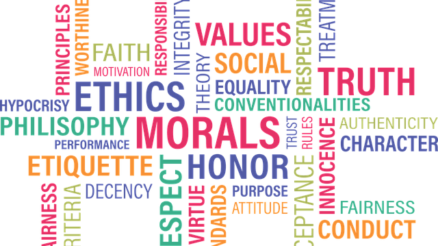
Importance of Etiquette in Workplace and Tips to Follow Etiquette

How to Recover from Gaslighting at Work? – Proven Strategies

Importance Of Critical Thinking In The Workplace

October 24, 2023
Did you know that you make 35,000 remotely conscious decisions in a given day? Think about it - you have to decide whether you want to get up when your alarm rings or hit snooze, how long to take a shower for, what to wear, what to eat for breakfast, and the list goes on.
When you step into a workplace, your decisions revolve around when to grab a cup of coffee, if you would like to converse with your colleagues during your break, and what you should start work on once you have settled in at your desk.
Of course, there are some decisions you routinely address, and then there are others that require more focus and attention. In hiring, specifically, critical thinking is a soft skill that is rare to find and highly prized among potential candidates.
Employees with strong critical thinking skills are able to solve problems better and thus drive more effective results. In this blog post, we discuss the importance of critical thinking in the workplace and how it can be promoted and cultivated:
What is critical thinking?
Critical thinking involves using rationality and common sense to determine the best decision in a given situation. You can absorb information and then use that information to make deductions and drive desirable outcomes.
Critical thinking also makes you adept at studying arguments, identifying inconsistencies, and using introspection to develop stronger solutions.
Many companies, therefore, tend to value critical thinking in employees and assign them to complex projects that require more than just average effort. Key critical thinking skills include:
- Analysis - gathering and interpreting information as relevant
- Inference - reaching conclusions based on the data
- Observation - being able to notice and identify gaps and opportunities
- Communication - sharing those solutions with relevant team members along with appropriate explanations and supporting data
- Problem-solving - troubleshooting solutions based on those conclusions
What are critical thinking examples in the workplace?
One typical example of critical thinking at work is problem-solving , which involves identifying and analyzing a problem, evaluating potential solutions, and implementing the most effective one.
For instance, a manager might use critical thinking to address a production issue by analyzing the root cause, evaluating various solutions, and selecting the best one to improve the production process.
Another example is decision-making, which enables the employee to weigh the pros and cons of different options and make a rational choice. This can include evaluating the impact of a decision on the company’s bottom line or assessing the potential risks and benefits of a new product launch.
In another example, a data analyst will use critical thinking skills to identify trends, patterns, and anomalies in the data to make informed decisions and recommendations.
Critical thinking is also essential in communication, allowing employees to convey their ideas and understand others’ perspectives effectively. For example, a team leader who uses critical thinking skills will be able to present a proposal clearly and logically and anticipate and address any potential objections or concerns, thus enhancing the team dynamics .
Why critical thinking in the workplace matters
Regardless of your industry, you should be able to make reasonable, rational, and logical decisions without relying on a manager or colleague to make decisions for you.
Over the past 3 years, the proportion of jobs that demand critical thinking has increased by 158% .
Critical thinking sets an employee apart from those who merely memorize information or need to be told what to do. It is thus a highly coveted skill in any kind of workplace. Some ways in which it matters in the workplace include:
1. Making better decisions
Critical thinking enables employees to find the most efficient path forward at work and elsewhere. It is instrumental when it comes to big decisions, such as whether or not to apply for a promotion.
2. Meeting job requirements
Certain jobs, like those in the medical and legal professions, require employees to be good at complex problem-solving by default. Critical thinking is much more than nice to have in those cases.
3. Achieving greater happiness
Critical thinkers are able to understand themselves much better, which means they can make the necessary decisions to improve their lives. This will make them happier people.
4. Standing out as knowledgeable
In the information age, everyone has access to data. However, those who know how to sift through that data, find the relevant facts, and apply them to problem-solving are the ones who will make a mark as contributors and thought leaders.
5. Being open to new perspectives
Critical thinkers are always open to absorbing new information and seeing how it shines a light on questions they are trying to answer. This allows them to see situations from multiple perspectives and be open to opinions that differ from their own.
How to promote critical thinking in the workplace
Critical thinking is an ability - some are born with it, others nurture it along the way. Being a critical thinker does not just help employees get ahead at work but also help them make smarter decisions about their own life. Here is how to cultivate an environment at work that emphasizes critical thinking:
1. Hire and build a team of critical thinkers
Actively seek out and hire individuals with strong critical thinking skills using behavioral interviewing techniques to assess their abilities in areas such as logical reasoning, aptitude, and lateral thinking.
Additionally, by making this skill a desired competency for leadership positions and promotions, you can identify and develop a pipeline of talented critical thinkers who can take on key roles within the company, pushing forward succession planning.
2. Foster inquiry and learning at work
This can be achieved by creating opportunities for employees to reflect on their work and identify areas where more critical thinking could have been beneficial. For example, holding “lessons learned” discussions after completing essential projects will compel them to look back and identify areas for improvement and boost their learning agility .
3. Make it cool to ask questions
When working with others, it is important to ask questions to understand the topic from all angles. This includes considering who the topic is for, what it hopes to achieve, what other perspectives exist on the topic, and why it matters to the problem at hand.
Additional research may be needed to answer these questions adequately. Even when working independently, one must ponder over these questions to ensure a thorough understanding of the topic.
Fostering an environment where employees feel comfortable asking tough questions and openly discussing alternatives can encourage critical thinking and encourage them to question assumptions and explore new ideas.
4. Stimulate opinion formation
Armed with all the necessary information and answers, employees can make an informed opinion rather than something copied from their colleagues or someone online. However, encourage them to be open to changing it if new information comes their way.
The source of any information holds weight as it determines what angle is being pushed and whether there is any hidden agenda. For instance, information in an advertisement will always paint the brand in a positive light.
Whether it is a news article employees read or something a colleague passes on to them, it is vital not just to accept it blindly. Push employees to consider it, weigh it from all angles, understand what other perspectives might exist on it, and keep doing so until they find something that is the objective truth.
And information from an individual might be presented in a way that makes the individual look good. Wherever possible, it is essential to look for unbiased sources and study those. News sites, educational journals, and academic books are always good ideas.
Curiosity is a necessary part of true critical thinking and is the quality that even the smartest people often forget about. It is, therefore, essential to put oneself ahead of the pack and hold on to your curiosity.
Why people lack critical thinking skills
A study found that people are worried about the impact of technology on the acquisition of critical thinking skills. They also blamed deficits in critical thinking on changing societal norms and the education system.
Hire critical thinkers in the workplace
So you see how critical thinking is a highly valued soft skill in companies. It enables employees to make rational, logical, and informed decisions independently, without relying on others to make decisions for them.
The Critical Thinking Test is an effective tool for recruiters and hiring managers to identify qualified candidates from a pool of resumes and make objective hiring decisions. It reduces the administrative burden of interviewing many candidates and saves precious time by separating the wheat from the chaff.
The test screens candidates for skills such as making correct inferences, recognizing assumptions, making deductions, coming to conclusions based on given data, interpreting and evaluating arguments. The insights generated from this skill assessment test can be used to identify the best candidates for the role. Give it a go today!
What are the four qualities of critical thinkers?
The four main qualities of critical thinkers are curiosity, open-mindedness, skepticism, and flexibility. They possess a desire to learn and explore new ideas, a willingness to consider and evaluate different perspectives, a questioning attitude and tendency to seek evidence, and the ability to adapt their thinking and outlook in light of new information or evidence.
What are the barriers to critical thinking in the workplace?
One of the main barriers to critical thinking in the workplace is the pressure to conform to group opinions or company culture. This can lead individuals to suppress their thoughts and ideas and instead go along with the status quo.
Another barrier is the tendency to rely on intuition or gut feelings rather than taking the time to gather and evaluate evidence. This can lead to poor decision-making. Cognitive diversity biases such as confirmation bias and groupthink can impede critical thinking.
Confirmation bias is the tendency to seek out and interpret information in a way that confirms one’s preexisting beliefs. At the same time, groupthink is where a group’s desire for harmony and agreement overrides the critical evaluation of ideas and information.
Asavari is an EiR at Adaface. She has made it her mission to help recruiters deploy candidate-friendly skill tests instead of trick-question based tests. When taking a break, she obsesses over art.
Spending too much time screening candidates?
We make it easy for you to find the best candidates in your pipeline- with a 40 min skills test.

[email protected]
- Product Tour
- Integrations
- AI Resume Parser
- Aptitude Tests
- Coding Tests
- Psychometric Tests
- Personality Tests
- Skills assessment tools
- 52 pre-employment tools compared
- Compare Adaface
- Compare Codility vs Adaface
- Compare HackerRank vs Adaface
- Compare Mettl vs Adaface
- Online Compiler
- Guide to pre-employment tests
- Check out all tools
Singapore (HQ)
32 Carpenter Street, Singapore 059911
Contact: +65 9447 0488
WeWork Prestige Atlanta, 80 Feet Main Road, Koramangala 1A Block, Bengaluru, Karnataka, 560034
Contact: +91 6305713227
🌎 Pick your language
Lorem ipsum dolor sit amet, consectetur adipiscing elit. Vivamus convallis sem tellus, vitae egestas felis vestibule ut.
Error message details.
Reuse Permissions
Request permission to republish or redistribute SHRM content and materials.
Cultivating Critical Soft Skills
Problem solving, time management and adapting to change are the most important soft skills, according to HR professionals and hiring managers.
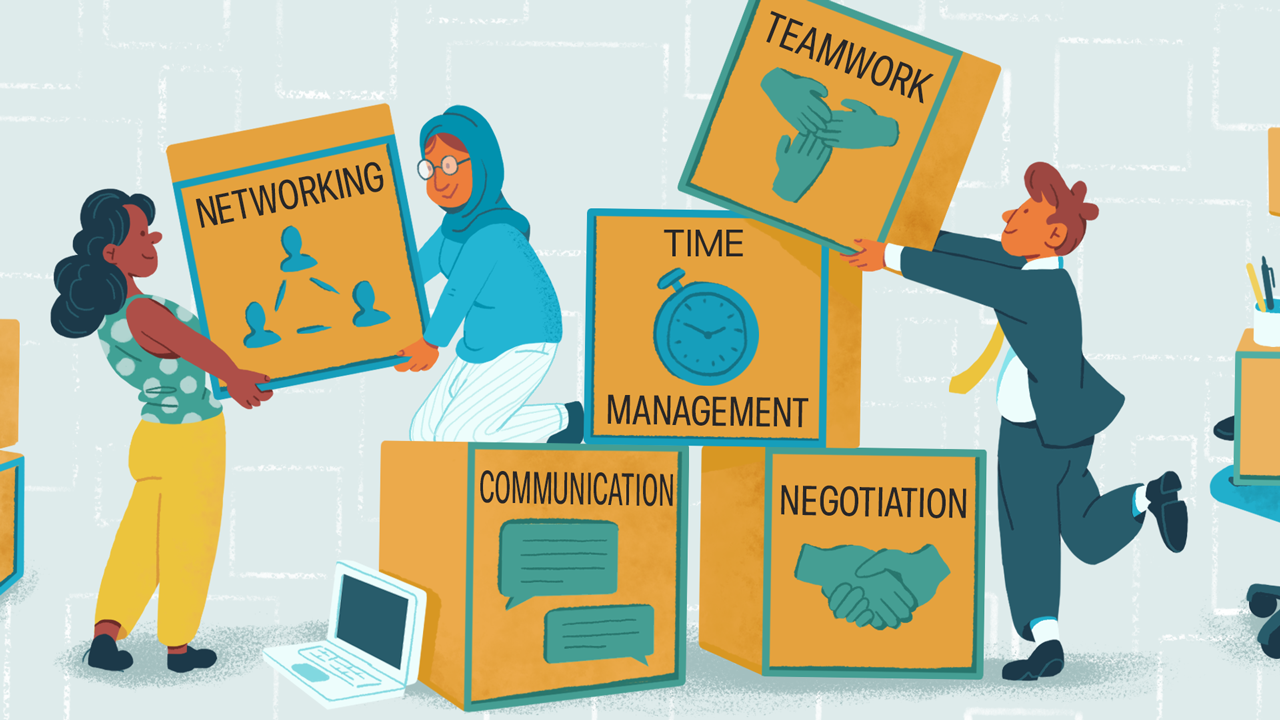
A worker’s gossiping was creating conflict among his team members. Neither his direct manager nor the team’s supervisor knew quite how to correct the behavior that was causing distrust among the group.
April Metcalf, SHRM-SCP, was the company’s HR director at the time. She used role playing with the manager and supervisor to help them learn how to address the situation, prepared them for possible responses from the employee when they met with her, and reviewed how to help prevent a repeat of the behavior.
“Role playing with the manager and supervisor helped them show more confidence and be prepared to discuss this [behavior] with the employee,” Metcalf says. “Going further, detailing potential situations with the employee helped her to see the discord that it was causing and [why it] was not helpful to the team.”
It was an example of soft-skill development—in this case, the skill of problem solving. Forty-two percent of HR professionals and hiring managers have identified problem solving as one of the top soft skills they are focusing on developing in their organizations, according to a report released by publishing company Wiley . The report captured survey responses from 600 HR professionals and hiring managers in the U.S.
Respondents indicated that time management (36 percent) and the ability to adapt to change (35 percent) were other needed areas of development. Half of the survey’s respondents said they think jobs require more soft skills now than when the COVID-19 pandemic began. “The push to remote work is one [reason], affecting how people work as members of virtual teams,” explains David Capranos, co-author of the report.
Training Should be Ongoing
As with hard skills such as digital communication and project management, soft skills need periodic updating. Wiley’s research found that:
- 44 percent of respondents expect workers to need continuous training to maintain soft skills.
- 43 percent said soft and durable skills wane within two years.
- 27 percent expect soft skills to last at least five years.
“You need these tools to carry with you throughout your career, but the way you apply them may change,” says Capranos, who also serves as director of market strategy and research at Wiley University Services.
Problem solving as an individual contributor is one thing; it’s different when you are put in charge of a team or managing a project, he explains.
What Managers Can Do
Higher education has taken notice of the need for soft skills in the workplace, and some schools are offering their students instruction in them. “More and more universities are trying to layer softer skills into their curriculum,” such as learning how to work effectively in teams, says Capranos. Sometimes companies will partner with universities to offer this type of education to their workers.
Wiley found that a number of its survey respondents leverage mentoring and reverse mentoring to develop soft skills, according to Capranos. Coaching is another strategy that can help employees develop or improve a soft skill, says Jennifer Dole, director and principal analyst at 3Sixty Insights, a research firm headquartered in North Billerica, Mass. Dole compares it to working with an athlete. “I’m going to observe you, I’m going to provide you some feedback and I’m going to observe you again,” she says.
And just as athletes have practice time, employees have role playing for practice. Game time is when employees use their newly developed soft skills to deliver a presentation or interact with a client, Dole explains.
Tips for Soft Skill Development
Consider the following strategies for helping your employees develop and improve their soft skills:
Give Clear Feedback
“If you're giving an employee feedback on something like time management, it’s important to define what that means in the context of their role and the impact of their experience, the team’s experience and the manager’s experience with the work,” Dole advises. “There might be a right answer, for right now, for what that skill is. And putting it in context of their job helps them to build that motivation to change their habits. It’s giving them next steps.”
Check in Regularly
Is there feedback you can offer regarding the soft skills the employees are working on? What have the employees done to improve in that area and feel proud?
Managers can provide employees with opportunities to practice a soft skill, says Addie Swartz, the founder and CEO of reacHIRE, an organization in Concord, Mass., that helps companies build and retain diverse workforces. “Often, there are assignments that come up last minute,” she says. Encourage them to raise their hand, “or go on a limb and say, ‘This project is coming up. Would you be interested in doing it?’ ” to create opportunities for stretch assignments. “Problem solving on those kinds of things has high visibility,” she says.
Working on time management skills could include meeting with employees to help them prioritize tasks, Swartz adds. Before meeting with employees, ask them to send you their five priorities for the week and the month. Then, during the meeting, reprioritize with the employees their short- and long-term tasks.
At that time, be open with the employees to enable them “to feel OK to say, ‘I’m underwater and I need help.’ ”
Know How Your Employees Learn Best
While managers can help employees develop a particular soft skill, it starts with an awareness of how the employees best learn, says Metcalf, who today is director of human resources for Bell County in Belton, Texas.
“From my experience, I believe that managers first have to take time and interest in their employees—beyond data and goals—to uniquely understand them as a person,” she says. “As managers, we must then determine with the employee how they best learn to be able to effectively help with that learning process. Some employees are going to learn best by observing, performing and building those skills, while others need a more formal classroom training.” Role playing and thought-provoking exercises, Metcalf says, “may help [develop] situational awareness.”
Manage Your Employees’ Growth
At Weaver, an independent accounting firm based in Houston, all newly promoted managers attend Pathways—a three-day training program—and undergo a year of coaching. Time management is one of the skills the coaching focuses on, according to Linc Ashby , chief talent officer at Weaver.
Alexis Robison, senior manager for learning and development at Weaver, found it helpful to set large and small individual goals to accomplish before the next coaching session.
“For my coaching clients, setting goals has really helped them feel more successful and like they’re accomplishing something great, no matter how big or small. Some of my clients have since put into effect monthly goals with each of their own team members,” Beebe says.
Managers must already possess the soft skill that they’re trying to develop in their direct reports, Dole points out. “Managers need more maturity in the soft skills to be able to coach employees on [them]. And we need to work on development into the daily routines and habits,” she says. “That’s why investing in leadership development is so important for the future, because it impacts the team experience.”
Related Content

Rising Demand for Workforce AI Skills Leads to Calls for Upskilling
As artificial intelligence technology continues to develop, the demand for workers with the ability to work alongside and manage AI systems will increase. This means that workers who are not able to adapt and learn these new skills will be left behind in the job market.

Employers Want New Grads with AI Experience, Knowledge
A vast majority of U.S. professionals say students entering the workforce should have experience using AI and be prepared to use it in the workplace, and they expect higher education to play a critical role in that preparation.
Advertisement

Artificial Intelligence in the Workplace
An organization run by AI is not a futuristic concept. Such technology is already a part of many workplaces and will continue to shape the labor market and HR. Here's how employers and employees can successfully manage generative AI and other AI-powered systems.
HR Daily Newsletter
New, trends and analysis, as well as breaking news alerts, to help HR professionals do their jobs better each business day.
Success title
Success caption
Unlocking Success: The Vital Role Of Critical Thinking In The Workplace
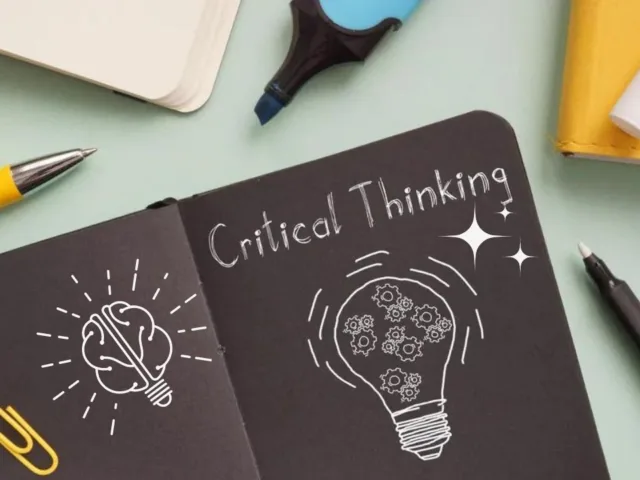
In today’s rapidly evolving business landscape, the ability to think critically is not just a desirable trait; it’s a necessity. Critical thinking skills are invaluable in navigating complex problems, making informed decisions, and driving innovation. Whether you’re a leader, a team member, or an individual contributor, honing your critical thinking abilities can significantly enhance your effectiveness in the workplace.
Understanding Critical Thinking
Critical thinking involves the ability to analyze, evaluate, and synthesize information to form well-reasoned judgments or decisions. It goes beyond simply accepting information at face value but rather involves questioning assumptions, considering multiple perspectives, and assessing the implications of different courses of action.
The Importance Of Critical Thinking In The Workplace
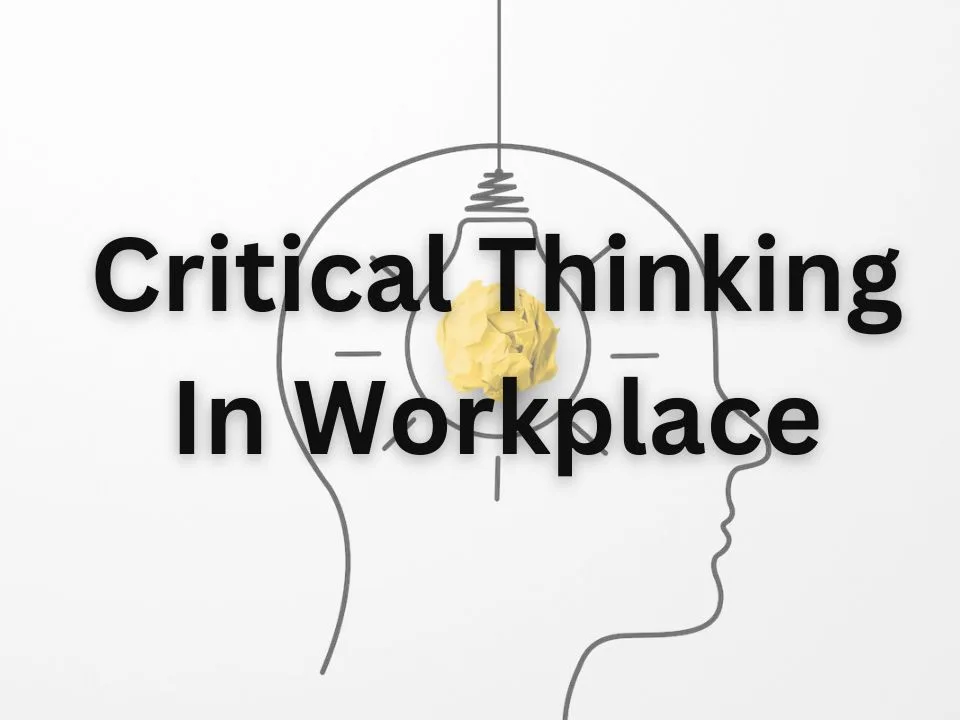
Here are 6 benefits of why critical thinking is important in the workplace:
1. Enhancing Problem-Solving Capabilities
One of the primary benefits of critical thinking in the workplace is its role in problem-solving. In today’s dynamic business environment, challenges arise regularly, ranging from minor setbacks to major crises. Employees who possess strong critical thinking skills are better equipped to assess the root causes of problems, identify potential solutions, and evaluate the best course of action.
2. Promoting Innovation & Creativity
Innovation thrives in environments where individuals are encouraged to think critically and challenge the status quo. By questioning existing processes, exploring alternative approaches, and synthesizing disparate ideas, employees can contribute to a culture of innovation within their organizations. Critical thinking fosters creativity by enabling individuals to connect seemingly unrelated concepts and envision new possibilities.
3. Making Informed Decisions
In a world inundated with information, the ability to sift through data, discern relevant facts, and draw logical conclusions is indispensable. Whether it’s evaluating market trends, assessing the viability of a new project, or weighing the pros and cons of different strategies, critical thinking enables leaders and employees alike to make informed decisions based on evidence and sound reasoning.
4. Fostering Effective Communication
Effective communication is essential for collaboration, conflict resolution, and achieving organizational goals. Critical thinking skills facilitate clear and coherent communication by helping individuals articulate their ideas, ask insightful questions, and engage in constructive dialogue. By promoting clarity and precision in communication, critical thinkers can minimize misunderstandings and foster stronger relationships within teams.
5. Navigating Uncertainty & Ambiguity
In today’s volatile, uncertain, complex, and ambiguous (VUCA) world, adaptability is crucial for success. Critical thinking equips individuals with the resilience and flexibility to navigate uncertain situations confidently. By embracing ambiguity and reframing challenges as opportunities for growth, employees can approach unfamiliar scenarios with curiosity rather than fear.
6. Cultivating Leadership Potential
Effective leadership hinges on the ability to make sound judgments, inspire confidence, and guide teams toward shared objectives. Leaders who prioritize critical thinking foster a culture of intellectual rigor and analytical thinking within their organizations. By modeling critical thinking behaviors and encouraging employees to question assumptions and challenge conventional wisdom, leaders can empower their teams to achieve excellence.
In today’s knowledge-based economy, the ability to think critically is a cornerstone of professional success. Whether it’s solving complex problems, driving innovation, or making informed decisions, critical thinking skills are indispensable in the modern workplace. By investing in the development of critical thinking abilities among employees, organizations can position themselves for long-term success in an increasingly competitive landscape.
Filzah Hasha
Related posts.
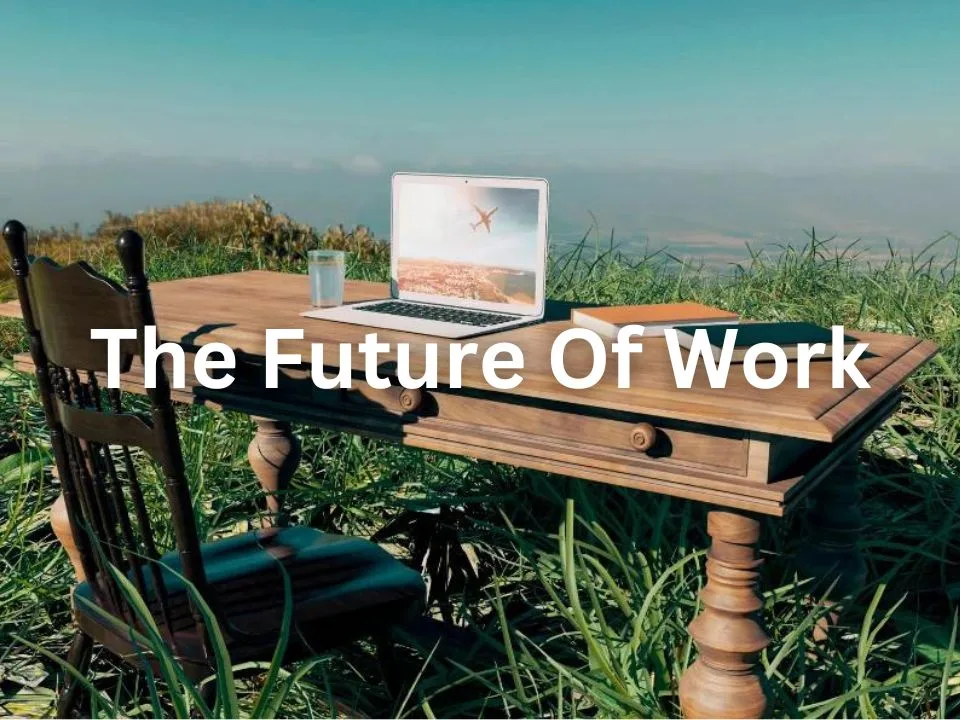
Predicting The Future Of Work: Insights From Jabra’s Comprehensive Analysis
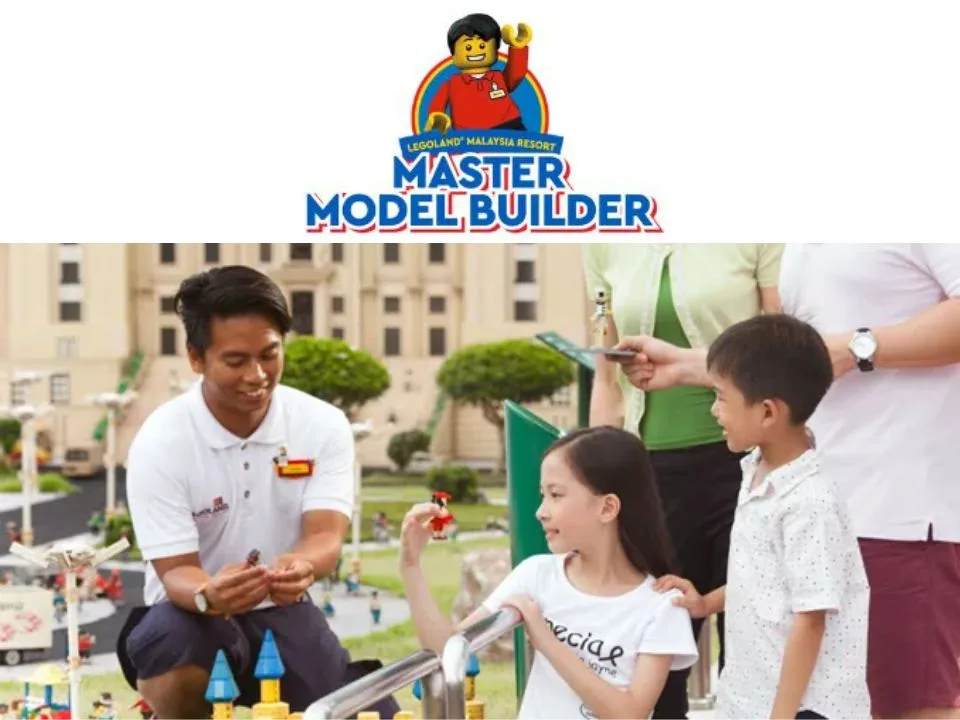
LEGOLAND® Malaysia Resort Offers Once-In-A-Lifetime Opportunity: Be The First Master Model Builder

Tips On How Women Can Get Ahead In the AI-Driven Workplace
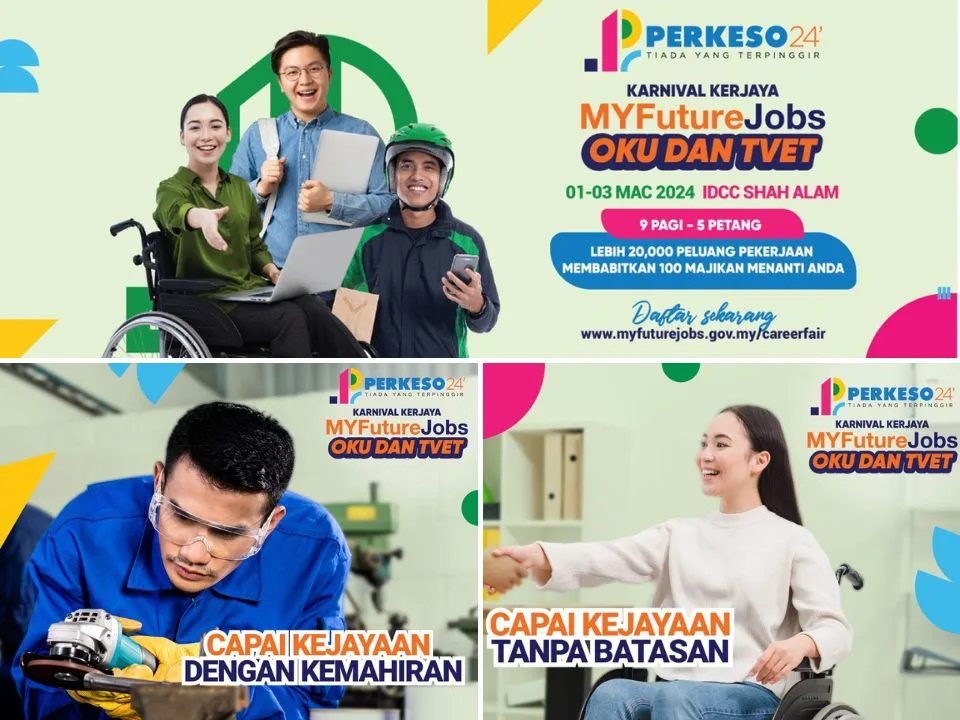
Empowering Job Opportunities For All Through MYFutureJobs Career Carnival 2024
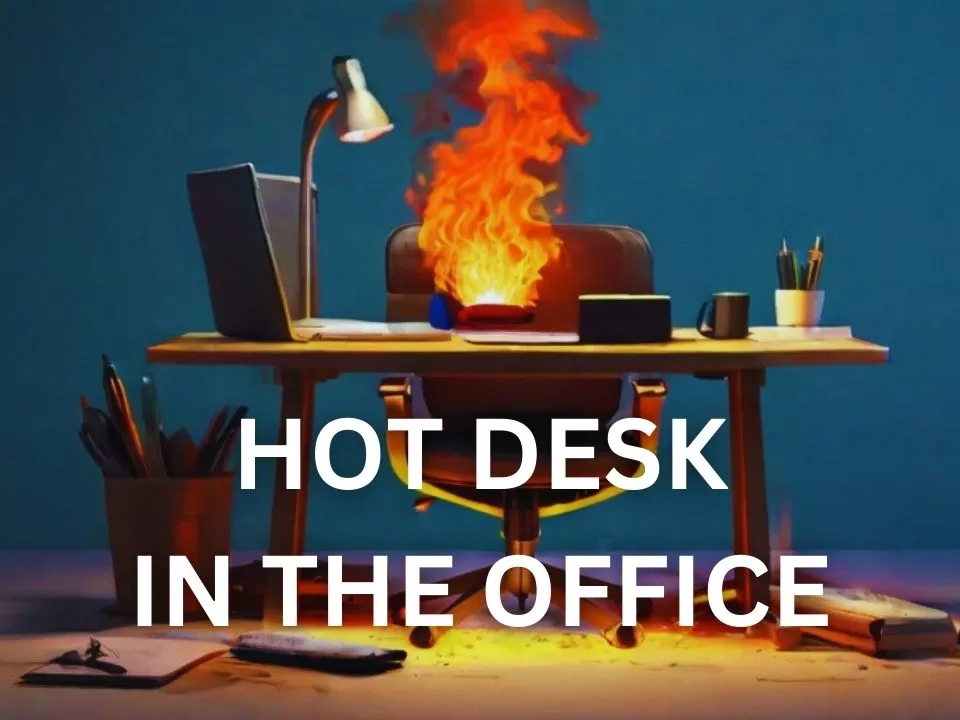
Here’s All You Need To Know About Hot Desking In The Office!
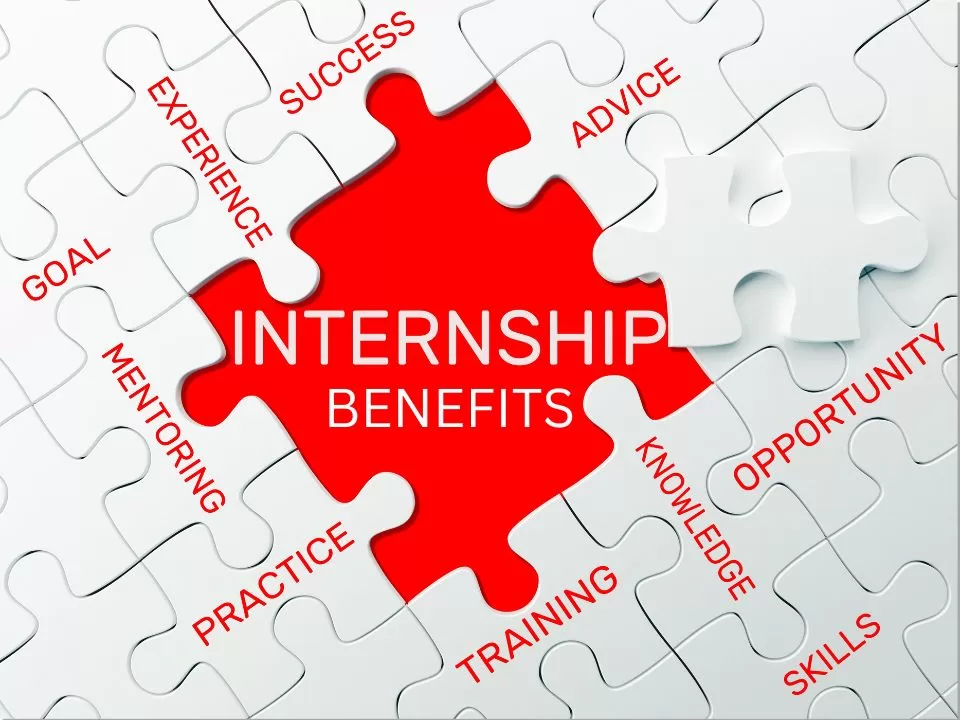
The Profound Benefits Of Internships For University Students!

FinanceBuzz
10 Job Skills Employers Want Younger People to Have
Posted: June 11, 2023 | Last updated: June 11, 2023

The education, skills, and experience you list on a resume are essential to getting your first job. But these aren’t the only things recruiters and interviewers have in mind when they’re looking for the right candidate.
They’re also on the lookout for soft skills — interpersonal and relationship management skills that are harder to quantify on paper.
If you’re new to the job market (or planning on re-entering it), it’s easy to overlook the importance of certain soft skills to would-be employers as you look for the right job to boost your bank account .
Here are some of the most important skills employers value beyond just degrees and expertise.
12 legit ways to earn extra cash

Adaptability
Excelling at a job isn’t just a matter of knowing your trade. It’s also about how well you can work in a fast-paced, real-world environment. This is much different from the more structured learning environment you’d get at a high school, trade school, or university.
For instance, can you problem-solve on your feet? Are you able to easily pivot from one task to another without missing a beat? Can you adjust your skills and expectations to match the on-the-ground conditions of doing your job?
Your ability to adapt could differentiate you from a candidate with the same (or even better) qualifications who can’t adapt to changing demands of your job. It could be the difference maker in your ability to stop living paycheck to paycheck .
Get expert advice on making more money - sent straight to your inbox.

Reliability
The so-called "Great Resignation" followed by months of employees "quiet quitting" means most employers are desperate for workers they can rely on.
Along with knowing you’ll show up to work on time, employers like to know that they can rely on you to follow through on tasks you’ve committed to.
This doesn’t mean you have to commit to working at a company for an indefinite amount of time, nor does it mean taking on more tasks than you can reasonably handle without help.
Instead, it means building a reputation as a trusted employee who stays on task, gets to meetings on time, and consistently finishes work projects on or before a deadline.

Communication
One of the most important parts of any job is how well you get along with other people, including clients, customers, bosses, managers, and coworkers.
No matter how good you are at your job, if you can’t communicate effectively and respectfully with the people around you, you’ll be more of a liability than an asset to your company.
11 legit ways to make extra money

Problem solving
Some employers still want (or at least think they want) employees who will stick to the status quo and won’t question the company’s practices or procedures.
In reality, though, the most valuable employees are often the ones who can see a longstanding slowdown, hang-up, or error and propose a working solution.
This doesn’t mean you should walk into a job and start criticizing everything you disagree with. However, you can demonstrate your unique value to a company by addressing problems head-on instead of ignoring them.

Your desire to learn doesn’t have to stop once you leave school and enter the job market.
There’s almost always something new to learn about a job, skill, or company. Demonstrating your willingness to learn shows that you’re a dedicated employee who’s committed to growth.
Go out of your way to ask questions, puzzle through solutions, and dedicate yourself to getting better at your craft.
Not only will it make your current workplace better, but it will also set you apart in a constantly shifting job market where the desire to learn is a valuable commodity.

Critical thinking
Critical thinking doesn’t mean criticizing or overthinking things. Instead, it refers to your ability to look at a problem from several perspectives, understand your own bias, analyze all available data, and create meaningful solutions.
Critical thinking is a crucial part of becoming a good problem solver and is also an essential component of self-improvement.
No one wants to hire an employee who can’t reflect on their own performance and commit to the constant process of getting better.
5 Signs You’re Doing Better Financially Than the Average American

Collaboration
In most workplaces, you’ll need to do more than just communicate with your coworkers. You’ll also need to collaborate with them on projects, which means speaking respectfully, contributing fairly, and speaking to your expertise without stepping on their toes.
The best collaborators always do their fair share of the work, but they also know when to ask for help and how to take feedback.
Being the best you can be at your job’s technical skills is important, whether you work mainly by yourself or on a team. But those skills are often secondary to getting along with others.

Given enough time and dedication, you can teach someone to pick up practically any skill or job process. But it’s much harder to teach creativity, which is one reason it’s such a valuable commodity in the workplace.
If you’re creative, you can think outside the box to find novel solutions to problems. You see the world in a unique way and can assemble the pieces of a puzzle to make something new rather than reproducing the same tired thing over and over again.
Creative innovation is the main way companies grow, so showcasing your creativity at work can absolutely set you apart as an employee to keep around for the long term.
Pro tip: If you're looking for a job you can enjoy but it doesn't pay enough, consider also finding a way to make some extra cash to offset the salary.

Few (if any) employers want to hire people they can’t trust. Being honest about things like when you get to work, how many tasks you accomplish in a day, and how you’ve spent your time at work helps you establish a reputation as an employee others can rely on.
Honesty is the best policy in a few other areas too. For example, it’s important to be honest with yourself about what you can and can’t do at work.
Otherwise, you’ll have a hard time taking feedback and improving. It’s similarly important, to be honest about any mistakes you make or questions you have.
9 Things You Must Do Before The Next Recession

How comfortable are you seeing things from another person’s point of view?
Are you open to listening and learning from other people’s experiences rather than centering your own life experiences? Can you easily put yourself in someone’s shoes, or are you trapped in your own perspective?
Answering these questions is important to anyone who works in today’s globalized, diverse world. Developing empathy will make you a better coworker too. This will be an asset no matter what field you go into or where your career takes you after your first job.

Bottom line
Along with perfecting your resume, brushing up on these skills can set you apart in a candidate pool and make you even more appealing to your future employer. It could also help you get a better job so you can finally grow wealth and prepare for your future.
Plus, staying on top of skills like these is more than a great way to launch a career. It can prove crucial to establishing a decades-long career you’re both excited about and proud of.
More from FinanceBuzz:
- 6 genius hacks Costco shoppers should know
- 9 things you must do before the next recession.
- Can you retire early? Take this quiz and find out.
- 9 simple ways to make up to an extra $200/day
We may receive compensation from the products and services mentioned in this story, but the opinions are the author's own. Compensation may impact where offers appear. We have not included all available products or offers. Learn more about how we make money and our editorial policies .
More for You
Judge’s Alleged Bias Sparks Controversy in Trump’s Federal Trial
'Noon against Putin': Opposition urges Russians to fulfil Navalny's 'last wish'
Electric Vehicle Company Files Chapter 11 Bankruptcy
Warship identified off Florida coast 3 centuries after it sank
Marriage promotes 'White supremacy,' according to White university professor
Medicare, Medicaid Plans Could Drastically Change
‘Party’s over’: House GOP impeachment circus has Republican members running for the exits early
Trump Reportedly Authorized Secret CIA Smear Campaign Against China
The young men driving themselves to death
Critic's Notebook: Busy and Eclectic Oscars 2024 Telecast Delivers Many Highlights (and a Few Lowlights)
Southwest and United Airlines have bad news for passengers
Avoid Buying These 5 Electric Vehicles That Will Likely Break Down After 50,000 Miles
Kari Lake Wants Supreme Court To Upend How America Votes
The 31 Most Hard-to-Pronounce Words in the English Language
NFL News: Cardinals trade for a new quarterback to compete with Kyler Murray
Joe Rogan suggests one of the biggest problems with the Biden administration is the staff: ‘So ridiculous’
'Permanently barred?' Not! Donald Trump reaches out to wealthy Nikki Haley donors
3 lies women have been told about their bodies, according to a female doctor
How Lake Mead's Water Levels Will Change After Colorado Snowstorm
Kentucky GOP moves to criminalize interference with legislature after transgender protests
The Importance of Critical Thinking Skills for Students
Link Copied
Share on Facebook
Share on Twitter
Share on LinkedIn
.jpg)
Brains at Work!
If you’re moving toward the end of your high school career, you’ve likely heard a lot about college life and how different it is from high school. Classes are more intense, professors are stricter, and the curriculum is more complicated. All in all, it’s very different compared to high school.
Different doesn’t have to mean scary, though. If you’re nervous about beginning college and you’re worried about how you’ll learn in a place so different from high school, there are steps you can take to help you thrive in your college career.
If you’re wondering how to get accepted into college and how to succeed as a freshman in such a new environment, the answer is simple: harness the power of critical thinking skills for students.
What is critical thinking?
Critical thinking entails using reasoning and the questioning of assumptions to address problems, assess information, identify biases, and more. It's a skillset crucial for students navigating their academic journey and beyond, including how to get accepted into college . At its crux, critical thinking for students has everything to do with self-discipline and making active decisions to 'think outside the box,' allowing individuals to think beyond a concept alone in order to understand it better.
Critical thinking skills for students is a concept highly encouraged in any and every educational setting, and with good reason. Possessing strong critical thinking skills will make you a better student and, frankly, help you gain valuable life skills. Not only will you be more efficient in gathering knowledge and processing information, but you will also enhance your ability to analyse and comprehend it.
Importance of critical thinking for students
Developing critical thinking skills for students is essential for success at all academic levels, particularly in college. It introduces reflection and perspective while encouraging you to question what you’re learning! Even if you’ve seen solid facts. Asking questions, considering other perspectives, and self-reflection cultivate resilient students with endless potential for learning, retention, and personal growth.A well-developed set of critical thinking skills for students will help them excel in many areas. Here are some critical thinking examples for students:
1. Decision-making
If you’re thinking critically, you’re not making impulse decisions or snap judgments; you’re taking the time to weigh the pros and cons. You’re making informed decisions. Critical thinking skills for students can make all the difference.
2. Problem-solving
Students with critical thinking skills are more effective in problem-solving. This reflective thinking process helps you use your own experiences to ideate innovations, solutions, and decisions.
3. Communication
Strong communication skills are a vital aspect of critical thinking for students, helping with their overall critical thinking abilities. How can you learn without asking questions? Critical thinking for students is what helps them produce the questions they may not have ever thought to ask. As a critical thinker, you’ll get better at expressing your ideas concisely and logically, facilitating thoughtful discussion, and learning from your teachers and peers.
4. Analytical skills
Developing analytical skills is a key component of strong critical thinking skills for students. It goes beyond study tips on reviewing data or learning a concept. It’s about the “Who? What? Where? Why? When? How?” When you’re thinking critically, these questions will come naturally, and you’ll be an expert learner because of it.
How can students develop critical thinking skills
Although critical thinking skills for students is an important and necessary process, it isn’t necessarily difficult to develop these observational skills. All it takes is a conscious effort and a little bit of practice. Here are a few tips to get you started:
1. Never stop asking questions
This is the best way to learn critical thinking skills for students. As stated earlier, ask questions—even if you’re presented with facts to begin with. When you’re examining a problem or learning a concept, ask as many questions as you can. Not only will you be better acquainted with what you’re learning, but it’ll soon become second nature to follow this process in every class you take and help you improve your GPA .
2. Practice active listening
As important as asking questions is, it is equally vital to be a good listener to your peers. It is astounding how much we can learn from each other in a collaborative environment! Diverse perspectives are key to fostering critical thinking skills for students. Keep an open mind and view every discussion as an opportunity to learn.
3. Dive into your creativity
Although a college environment is vastly different from high school classrooms, one thing remains constant through all levels of education: the importance of creativity. Creativity is a guiding factor through all facets of critical thinking skills for students. It fosters collaborative discussion, innovative solutions, and thoughtful analyses.
4. Engage in debates and discussions
Participating in debates and discussions helps you articulate your thoughts clearly and consider opposing viewpoints. It challenges the critical thinking skills of students about the evidence presented, decoding arguments, and constructing logical reasoning. Look for debates and discussion opportunities in class, online forums, or extracurricular activities.
5. Look out for diverse sources of information
In today's digital age, information is easily available from a variety of sources. Make it a habit to explore different opinions, perspectives, and sources of information. This not only broadens one's understanding of a subject but also helps in distinguishing between reliable and biased sources, honing the critical thinking skills of students.
Unlock the power of critical thinking skills while enjoying a seamless student living experience!
Book through amber today!
6. Practice problem-solving
Try engaging in challenging problems, riddles or puzzles that require critical thinking skills for students to solve. Whether it's solving mathematical equations, tackling complex scenarios in literature, or analysing data in science experiments, regular practice of problem-solving tasks sharpens your analytical skills. It enhances your ability to think critically under pressure.
Nurturing critical thinking skills helps students with the tools to navigate the complexities of academia and beyond. By learning active listening, curiosity, creativity, and problem-solving, students can create a sturdy foundation for lifelong learning. By building upon all these skills, you’ll be an expert critical thinker in no time—and you’ll be ready to conquer all that college has to offer!
Frequently Asked Questions
What questions should i ask to be a better critical thinker, how can i sharpen critical thinking skills for students, how do i avoid bias, can i use my critical thinking skills outside of school, will critical thinking skills help students in their future careers.
Your ideal student home & a flight ticket awaits
Follow us on :

amber © 2023. All rights reserved.
4.8/5 on Trustpilot
Rated as "Excellent" • 4700+ Reviews by Students


IMAGES
VIDEO
COMMENTS
Critical thinking is considered a soft skill, which means it's a skill inherent in a person's personality. That said, it is possible to develop this skill. Related: 5 Examples of Critical Thinking Skills Critical thinking in the workplace Here are some of the ways critical thinking is important to the workplace: Some professions require it
Ask questions and dig deep, rather than accepting information at face value. Keep your own biases and perceptions in check to stay as objective as possible. Rely on your emotional intelligence to fill in the blanks and gain a more well-rounded understanding of a situation. So, critical thinking isn't just being intelligent or analytical.
Using your critical thinking skills in the workplace will define you as a problem solver. This is not only useful career-wise (although having upper-level people at your company think highly of you is undoubtedly a benefit) it also establishes you as a leader among your fellow team members.
According to the University of the People in California, having critical thinking skills is important because they are [ 1 ]: Universal. Crucial for the economy. Essential for improving language and presentation skills. Very helpful in promoting creativity. Important for self-reflection.
This highlights the importance of fostering a workplace culture that actively encourages and nurtures critical thinking skills. 2. Critical thinkers make great managers. Many critical thinking skills - like problem-solving and communication - are textbook signs of a great manager.
Instead, most managers employ a sink-or-swim approach, ultimately creating work-arounds to keep those who can't figure out how to "swim" from making important decisions. But it doesn't ...
Critical thinking skills are universal. You can apply them to situations in your personal life, but you can also use them in any role you find yourself in. Improving your critical thinking skills can assist you in performing your work functions more efficiently. Follow these steps to improve your critical thinking skills: 1. Assess new information
Understanding why critical thinking is important means knowing how teams interact and solve problems with these skills. Without critical thinking skills, staff may take situations for granted, or accept information without questioning it. Thinking critically also helps when encountering unique situations or new information, as these same skills ...
Critical thinking is the ability to thoughtfully analyze information, evaluate different perspectives, and make reasoned judgments. It involves the systematic examination of facts, data sources ...
4. Evaluate all existing evidence and be open to revising your hypothesis. Pull in related information for a more systemic, broader understanding of the issue. 5. Develop conclusions based on data and present recommendations. Drawing conclusions is the final and most crucial part of critical thinking.
Here's a breakdown of how to teach critical thinking in the workplace: Identify problem areas. Executives and managers should assess workplace areas most lacking in critical thinking. If ...
The critical thinking process doesn't necessarily lead to a cut-and-dry solution—instead, the process helps you understand the different variables at play so you can make an informed decision. 6. Present your solution. Communication is a key skill for critical thinkers.
Businesses thrive on well-informed decision-making, and critical thinking is the compass that guides this process. A workforce with critical thinking skills is adept at gathering, analyzing, and synthesizing information, leading to strategic, informed, and unbiased choices. This, in turn, minimizes errors and maximizes positive outcomes, laying ...
Work on projects or scenarios that require critical thinking skills to develop practical problem-solving approaches. Apply critical thinking in real-life situations whenever possible. This could involve analyzing news articles, evaluating product reviews, or dissecting marketing strategies to understand their underlying rationale.
Third, seek out fresh perspectives. It's tempting to rely on your inner circle to help you think through these questions, but that won't be productive if they all look and think like you. Get ...
(thinking and reasoning) skills as well as behavioural tendencies and biases which are termed dispositions. Watson-Glaser's History and Ongoing Development . In 1990 a panel of 46 experts in critical thinking came together and worked toward a consensus . definition of the cognitive and dispositional skills of critical thinking. They agreed ...
Critical thinking can help you better understand yourself, and in turn, help you avoid any kind of negative or limiting beliefs, and focus more on your strengths. Being able to share your thoughts can increase your quality of life. 4. Form Well-Informed Opinions.
Critical thinking at work is one of the most important soft skills for any employee at any level in the organization to cultivate. Unlike hard skills, like knowing a specific language or software ...
Developing your critical thinking skills will help you become a valued member of any team—at work, at school, or anywhere solid decision-making skills are needed. Here are some ways to improve and utilize your critical thinking skills: Keep the goal in mind. Know your biases and try to look past them. Ask questions and gather information
In the modern workplace, the ability to think critically is more than just a valuable asset—it's a necessity for success. According to a recent survey by the World Economic Forum, 36% of employers consider complex problem-solving skills, a key component of critical thinking, as the top skill they seek in their workforce.. This blog post explains this top skill - critical thinking skills ...
Some ways in which it matters in the workplace include: 1. Making better decisions. Critical thinking enables employees to find the most efficient path forward at work and elsewhere. It is instrumental when it comes to big decisions, such as whether or not to apply for a promotion. 2.
Another benefit of critical thinking in the workplace is creativity. Individuals with strong critical thinking skills tend to be more creative than others. This can benefit a workplace significantly, as it can lead to innovation. Creativity in the workplace can also improve productivity and employee morale.
In today's fast-paced, complex, and dynamic work environment, critical thinking is more critical than ever before. It is crucial for organizations to prioritize critical thinking skills among ...
Gain a deeper understanding and develop critical skills. Topics & Tools Stay up-to-date with the latest workplace news and leverage our vast library of resources to streamline day-to-day workplace ...
Whether it's solving complex problems, driving innovation, or making informed decisions, critical thinking skills are indispensable in the modern workplace. By investing in the development of critical thinking abilities among employees, organizations can position themselves for long-term success in an increasingly competitive landscape.
Critical thinking is a crucial part of becoming a good problem solver and is also an essential component of self-improvement. ... Being the best you can be at your job's technical skills is ...
Why Is Nurse Leadership Important? Nurse leaders make a difference in workplace culture and drive positive changes in health care legislation. When a team admires the qualities of their leader, it boosts morale and promotes a psychologically safe workplace, which leads to higher job satisfaction and retention rates.
How can students develop critical thinking skills. Although critical thinking skills for students is an important and necessary process, it isn't necessarily difficult to develop these observational skills. All it takes is a conscious effort and a little bit of practice. Here are a few tips to get you started: 1. Never stop asking questions
0 likes, 0 comments - rdio_hub on March 12, 2024: " Importance of Publishing Research Papers in College Hey RDIO fam! Today, we're di..."